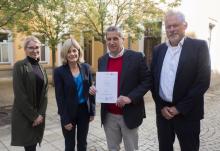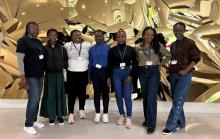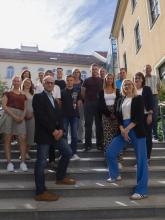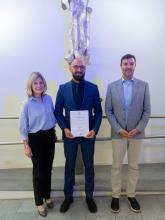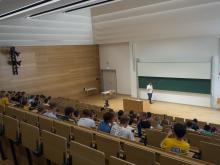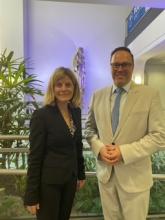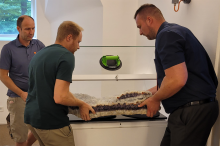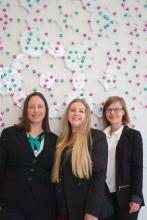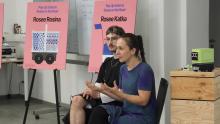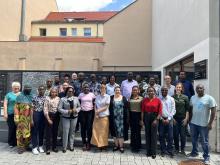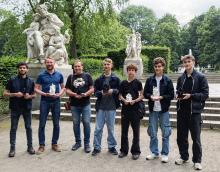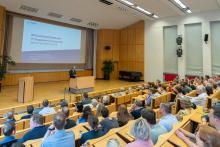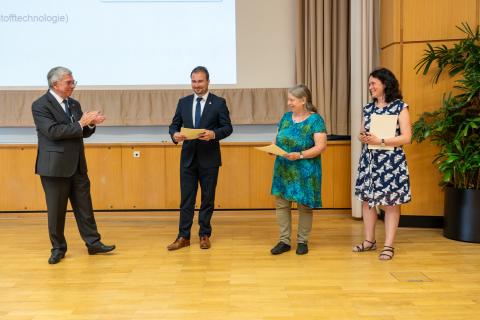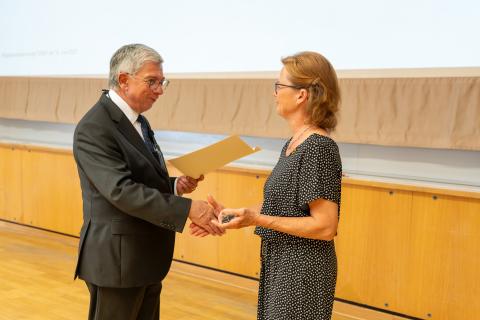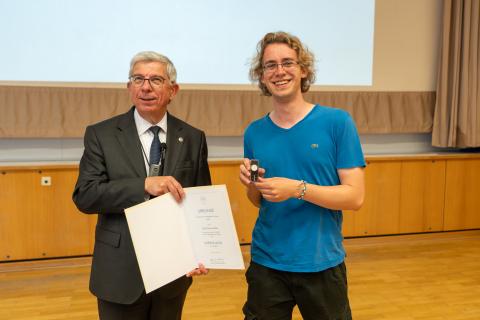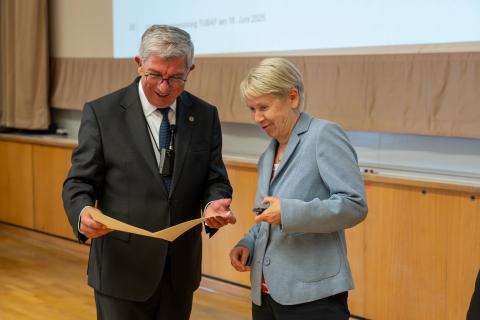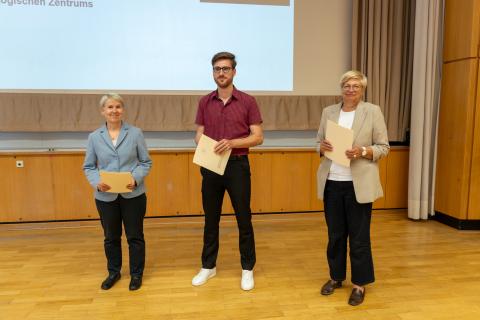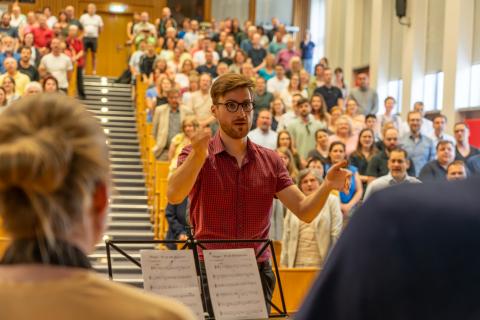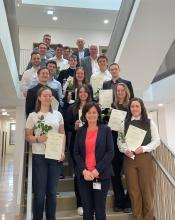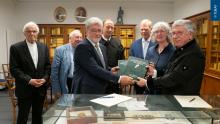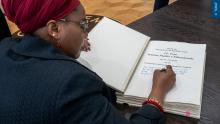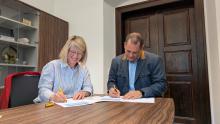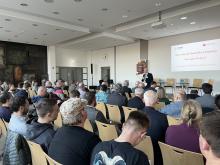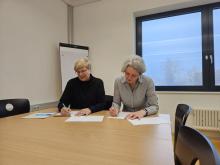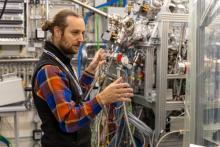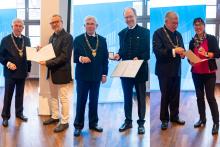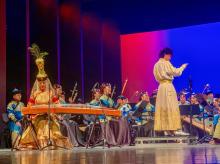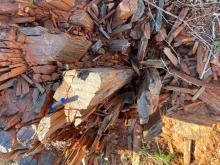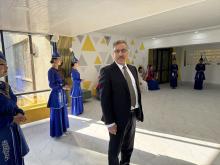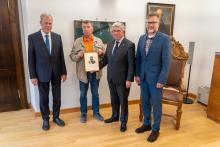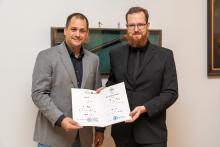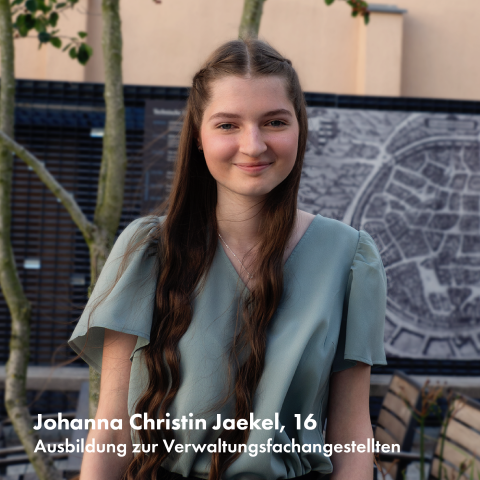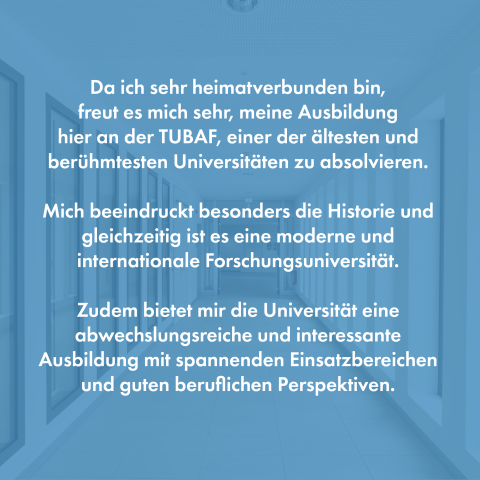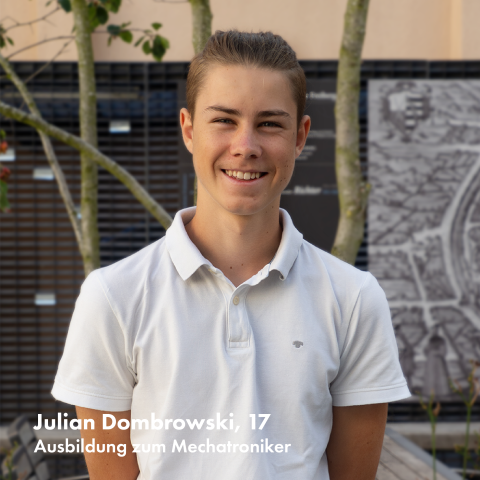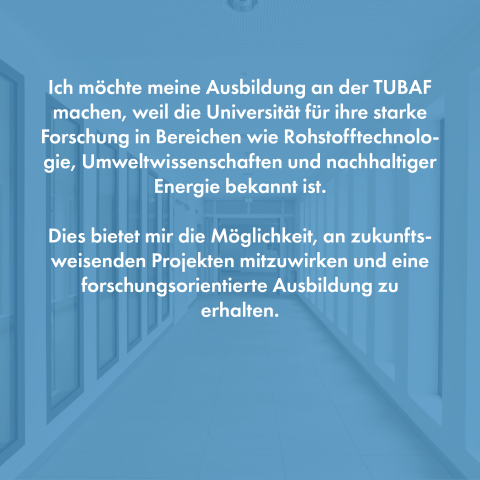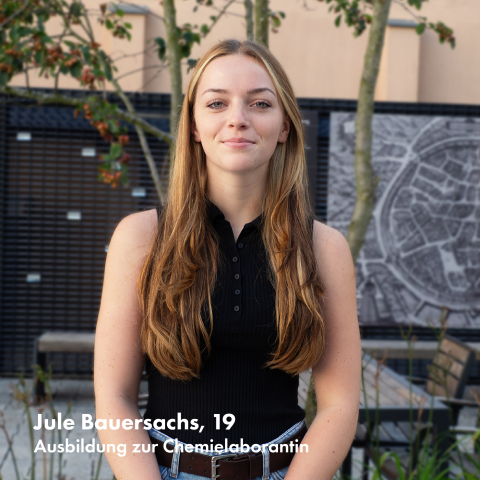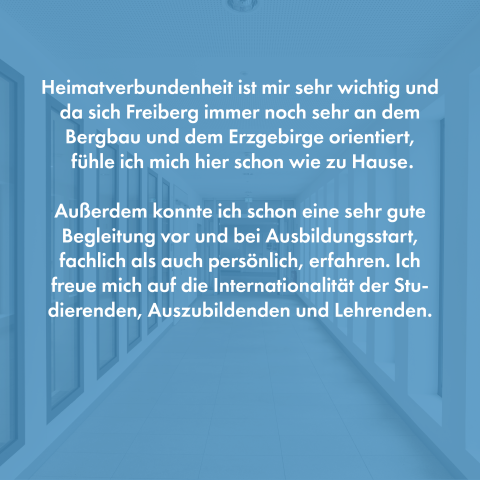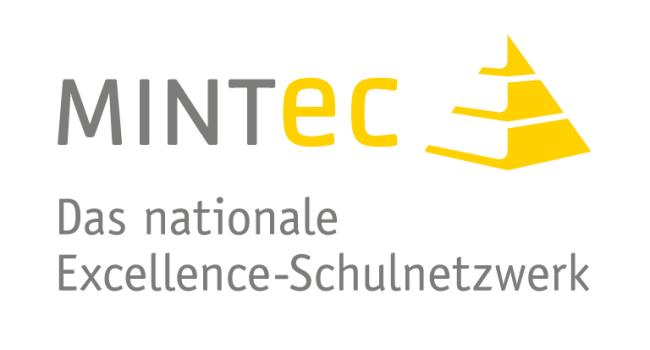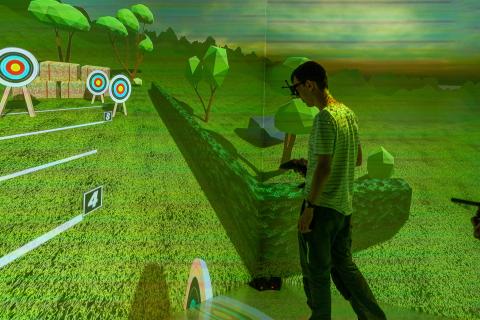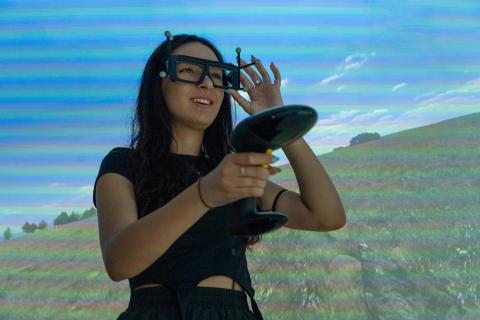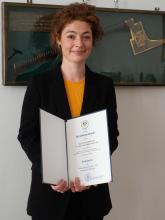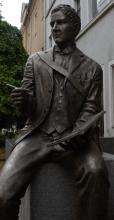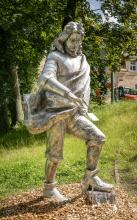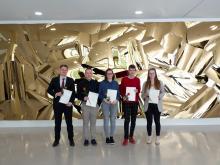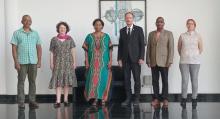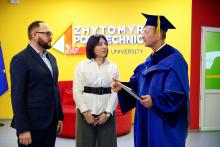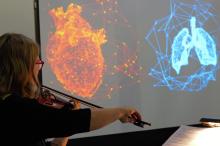
Kunst trifft Wissenschaft: Performance Interoception am ZeHS
Meldung vom 10.11.2025
Bei der Veranstaltungsreihe Kunst trifft Wissenschaft wird das Atrium des ZeHS zu einem Ort der Begegnung. Unter dem Titel Interoception gab ein international zusammengesetztes Quartett spannende Einblicke in den systemischen Zusammenhang der Wahrnehmung äußerer Reize und innerer Vorgänge, vom kognitiven bis in den physiologischen Bereich: Eine Komposition aus musikalischer Darbietung (Harfe, Violine und wissenschaftlicher Vortrag), audiovisuellem Design auf der Grundlage erhobener Messdaten zu EEG und EKG sowie Atemaktivität während des Musizierens. Eine Aussage, die vielleicht den Bogen besonders beschreibt, ist „Wahrnehmung ist ein verkörperter Prozess“. Interoception zielt auf Erkenntnis, wie Informationen aus Organen wie Herz und Lunge unsere Wahrnehmung formen. Die Künstler zeigten sich auf ganz modernem Stand der Forschung. Gefördert wurde das Vorhaben vom Forum für Künstlerische Umsetzung e.V.
New cooperation: Students from Angola begin their studies at TUBAF
3.11.2025
In spring 2025, TU Bergakademie Freiberg launched a new international cooperation with the Angolan Ministry of Mineral Resources, Oil and Gas. Similar to the successful scholarship program for students from Mozambique, the respective country's resource ministry provides funding for studies at TUBAF in the field of mineral resources management. This collaboration strengthens scientific exchange and contributes to the development of skilled professionals in Angola. The first five scholarship recipients began their studies in English-language Master's programs in Freiberg this winter semester. Depending on their academic interests, TUBAF will also support access to undergraduate studies in the future.
Expanding Successful Cooperation to Other Countries
A cooperation with the Ministry of Mineral Resources and Energy of Mozambique (MIREME) has been in place for more than ten years. Up to ten prospective students from Mozambique, the best in their country, come to TUBAF each year. After intensive language courses that prepare them for university entrance exams and university studies, they begin their studies in mining and geosciences. The successful concept is now intended to enable prospective students in Angola to study at TUBAF as well.

Extracting raw materials in an environmentally friendly and sustainable manner: New professor for opencast mining and recultivation
3.11.2025
TUBAF alumnus Professor Martin Kreßner was appointed Professor of Open-Cast Mining and Reclamation at the Faculty of Geosciences, Geotechnical Engineering and Mining on 1 November. He succeeds Professor Carsten Drebenstedt (Chair of Mining and Open-Cast Mining), who retired at the end of September.
The mining expert earned both his degree and his doctorate at Alma Mater Fribergensis. "Among other things, my return to TUBAF gives me the opportunity to resume my university research topics and to scientifically deepen the topics from my own industrial development work. My focus is on the application of machine learning for modelling multivariate dependency structures within cutting and extraction processes, the technological advancement of secondary deposit recovery (e.g. tailings) and the scientific analysis of the state of knowledge on recultivation within the East German mining areas and worldwide."
In teaching, mining engineers aim to combine structured knowledge transfer with independent knowledge acquisition within the framework of practical project work. "We have all experienced how motivation for peak performance can arise from the connection to real project tasks. For a personal development experience, it is necessary to acquire knowledge yourself, use modern work tools confidently and be able to contribute individual skills to a functioning team. The teaching of background information on boundary conditions and dependencies between and within the processes under consideration by the lecturer then only forms the framework for enabling young engineers and scientists to develop efficient and innovative solutions."
In his professional activities at a German mining company and an internationally active mining machinery manufacturer, Martin Kreßner gained worldwide experience in technical standards and development trends, technological practices, and group- and country-specific problem-solving cultures. ‘A sound education is and must remain the hallmark of a graduate engineer. In addition, we must prepare our young talent to apply this knowledge routinely in innovative problem-solving approaches. Only in this way can we master the tasks ahead and develop an international competitive advantage.’
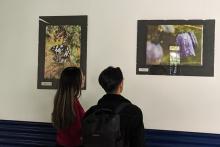
TUBAF blüht - Fotoausstellung in der Neuen Mensa
Meldung vom 14.10.2025
Aus einem Fotowettbewerb der studentischen AG Umwelt wurde eine Ausstellung, die die Vielfalt der Natur auf dem Campus zeigt: Mit Unterstützung der Universitätsbibliothek, der Universitätskommunikation und einer uniinternen Jury hat die AG Umwelt aus 77 eingereichten Einsendungen die besten Fotos ausgewählt. Diese Fotos sind ab morgen (15.10.2025) im Foyer der Neuen Mensa zu sehen.
„Die AG Umwelt und andere Vertreterinnen und Vertreter an der TUBAF setzen sich seit Jahren für eine insektenfreundlichere Rasenpflege auf dem Campus ein. So konnten wir im Sommersemester 2024 erreichen, dass auf einzelnen Wiesen auf dem Campus sowie auf 4 Wiesen des Studierendenwerks (mit Schild gekennzeichnet) der Mahdplan angepasst wurde“, erzählt Student Noah Zappek von der AG Umwelt, der den Fotowettbewerb „TUBAF blüht“ mitorganisiert hat.
Damit dieses Engagement noch sichtbarer wird, hat die AG Umwelt Uniangehörige aufgefordert, den blühenden Campus zu fotografieren und die Fotos von Blütenpflanzen sowie von Insekten auf und an Pflanzen beim Wettbewerb einzureichen. „Es haben 43 Studierende und Mitarbeitende teilgenommen und insgesamt 77 Fotos eingesendet. In einem Jury-Voting mit Vertretern der AG Umwelt, der Universitätsbibliothek und des Dezernats für Universitätskommunikation sowie einer Umfrage unter allen Universitätsangehörigen wurden die Gewinner-Fotos gekürt. Das Studierendenwerk hat uns freundlicherweise das Foyer der Mensa für die Ausstellung zur Verfügung gestellt. Also einfach vorbeikommen!“

Materialforschung mit Röntgenlaser: Teilnehmerrekord im elften Jahr der „Freiberg Lectures“ am European XFEL
Meldung vom 13.10.2025
Seit elf Jahren ermöglicht eine einzigartige Kooperation Studierenden der TU Bergakademie Freiberg einen Einblick in die Welt der Röntgenlaser. Die Studierenden, die vom 22. bis 26. September die jährlich stattfindende Blockvorlesung bei European XFEL besuchten, waren damit bereits die elfte Gruppe aus Freiberg, die an dem Programm der internationalen Forschungseinrichtung teilnahm. Mit 44 Teilnehmenden brachen sie damit einen neuen Rekord. Die Studierenden verbrachten zu Beginn der Woche eine Nacht in Hamburg und vertieften bei einem Besuch des Campus des European XFEL ihre Kenntnisse über den Aufbau und die Anwendungen des Röntgenlasers, der zu den modernsten und hellsten Röntgenstrahlungsquellen der Welt zählt. Zusätzlich unternahmen die Studierenden Exkursionen zur Röntgenstrahlungsquelle PETRA III und einem der weltweit ersten Freie-Elektronen Laser: FLASH am DESY in Hamburg.
Die Vorlesungsreihe „Materialforschung mit Röntgen-Freie-Elektronen-Lasern (XFEL)“ wird geleitet von TU Freiberg-Professor Serguei Molodtsov, der auch Wissenschaftlicher Direktor bei European XFEL ist, und Dr. Friedrich Roth vom Institut für Experimentelle der TU Bergakademie Freiberg. Während des einwöchigen Kurses lernten die Studierenden direkt von den Forschenden, darunter führende Wissenschaftlerinnen und Wissenschaftler sowie Gruppenleiterinnen und Gruppenleiter am European XFEL, über Entwicklungen und Anwendungen der hochmodernen Röntgenlichtquelle. „Die hohe Nachfrage zeigt uns, dass wir mit dieser besonders intensiven Kooperationsform auf dem richtigen Weg sind“, sagt Friedrich Roth. Serguei Molodtsov ergänzt: „Es ist uns eine große Freude, diese Vorlesungsreihe über so einen langen Zeitraum hinweg zu organisieren. Die Begeisterung der Teilnehmenden für die Forschung und die Arbeit des European XFEL wird auch darin deutlich, dass die Freiberg Lectures erste belastbare Verbindungen schaffen, und wir beobachten, dass viele dieser jungen Frauen und Männer als Master-Studierende oder Doktorandinnen und Doktoranden zurückkehren. Dies ist ein weiterer wichtiger Bestandteil dieser großartigen Zusammenarbeit.“

TU Freiberg unites mathematics and AI – ProofBench workshop lays foundation for a benchmark in formal reasoning
10.10.2025
From 22 September to 3 October 2025, TU Freiberg hosted the ProofBench workshop, bringing together about twenty researchers from Germany,
Sweden, the United Kingdom, and Australia. Their goal: to create a benchmark suite for mathematical proofs that will allow AI systems to be evaluated on genuine reasoning tasks — and to identify their current limitations.
Participants particularly valued the cooperative exchange between pure mathematicians and formalisation experts. This interdisciplinary spirit embodies TU Freiberg’s Informed AI strategy, which aims to strengthen the university’s position as a centre for AI and formal reasoning in Saxony and beyond.
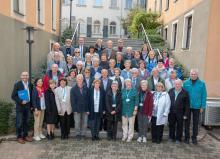
Goldenes Diplom: Wie sich das Chemiestudium in 50 Jahren verändert hat
Meldung vom 7.10.2025
47 Alumnae und Alumni der TUBAF trafen sich am 2. Oktober 2025 an ihrer alten Alma Mater, um ein Wiedersehen 50 Jahre nach ihrem Studienabschluss zu feiern. Organisiert wurde die Zusammenkunft von Maria Pilz, selbst Alumna des Diplomjahrgangs 1975. Die Alumnibeauftragte der Universität, Constanze Bornkampf organisierte eine Feierstunde im Senatssaal, in der der Dekan der Fakultät 2, Herr Prof. Dr. Gero Frisch, über die aktuelle Ausbildung und berufliche Einsatzmöglichkeiten Informierte. Die Gruppe begab sich auf einen Spaziergang über den Campus, der für viele der Alumni mit dem Schlossplatzquartier, dem sogenannten Wissenschaftskorridor und den neuen Laborflügel des Clemens-Winkler-Bau ein komplett neues Gesicht bekommen hat. Für die laufende Sanierung des denkmalgeschützten Altbaus interessierten sich die Chemikerinnen und Chemiker besonders, verbinden sie damit doch besonders viele Erinnerungen. Seit 1954 wird der Bau ohne größere bauliche Änderungen genutzt; die Sanierung soll bis 2028 abgeschlossen sein.
Was sich aber geändert hat, ist die Struktur des Studiums. Alumna Maria Pilz berichtete, dass die Chemiestudierenden in den 1970er Jahren noch in Seminargruppen à 15 Personen studierten. „Ich habe für unser Alumnitreffen mein altes Studienbuch abfotografiert und habe im Nachhinein gestaunt, wie voll die Stundenpläne gepackt waren. Insgesamt war das System strukturierter und straffer. Die heutigen Studentinnen und Studenten haben mehr Freiheiten“, sagt Maria Pilz. Deutlich anders war auch die Laborsituation: „Inzwischen sind die Labore bestens, die waren damals eine Katastrophe. Auch der Betreuungsschlüssel ist heute viel besser.“ Eine Sache ist aus ihrer Sicht damals wie heute gleich: „Besser kann man nicht studieren als an einer kleinen Uni!“
An der TU Bergakademie Freiberg erhielten die Alumni eine Goldene Diplomurkunde und trugen sich als Highlight ihres Treffens außerdem in das Silberne Buch der Stadt Freiberg ein.
Scenarios for the future of energy: Jülich researcher appointed to professorship in energy economics
Professor Stefan Vögele has been the new Professor of Energy Economics at the Faculty of Economics at TU Bergakademie Freiberg since 1 October 2025. He develops models and scenarios for how various players in business and society can work together to achieve climate targets. The economist previously worked as a lecturer at TUBAF and headed the Socioeconomics Department at Jülich System Analysis within Forschungszentrum Jülich.
"The energy sector plays a central role in the transformation towards a sustainable economic system. At the same time, energy systems are extremely complex – suitable modelling and scenario studies provide guidance. I want to continue researching how these models can help to identify the best possible path to the energy transition at TU Bergakademie Freiberg,‘ Vögele says. Professor Stefan Vögele also aims to teach students how to model and evaluate energy scenarios: ‘They will learn about various approaches such as input-output analysis and cross-impact balance analysis.’
The new appointment is a joint appointment by the Faculty of Economics and Research Centre Jülich GmbH. Dean Professor Michael Höck comments: ‘The appointment of Professor Stefan Vögele to the Faculty of Economics is the result of a long-term cooperation with Forschungszentrum Jülich. The professorship offers all energy technology research institutions at TU Bergakademie Freiberg a wide range of opportunities for socio-economic evaluation of their innovations.’
About Jülich Systems Analysis
The research focus of Jülich Systems Analysis (ICE-2) is the unbiased, scientific investigation of technologies, technology paths, value chains and market ramp-ups in future energy systems, considering material requirements, sector coupling and framework conditions in policy and society. The addressees are science, decision-makers from politics, industry and social actors. To answer the research questions, Jülich Systems Analysis creates complex models to analyze and evaluate technologies, infrastructures and resources for future energy systems using an open-science approach. This is done in an interdisciplinary approach that considers the interaction of energy technologies with economic, ecological and social systems and thus focuses on security of supply, economic efficiency and environmental protection. An integral part of the research work is the creation of a consistent and sustainably usable data basis in accordance with the open data principle.
TUBAF establishes the “Ukrainian Prize in Combinatorics” – Summer School connects international young researchers
This summer, the Faculty of Mathematics and Computer Science at TU Freiberg hosted a vibrant Ukrainian Summer School. Leading international mathematicians — including Dan Kráľ, Danylo Radchenko, Marthe Bonamy, and Volodymyr Nekrashevych — offered mini-courses at the forefront of current research. For participants from Ukraine and beyond, it was a rare opportunity to deepen their expertise, meet eminent scholars, and join a growing international network anchored in Freiberg.
To further strengthen Ukrainian research excellence, TU Freiberg established the Ukrainian Prize in Combinatorics. This year’s award went to Andrii Arman for outstanding contributions in combinatorial geometry, including resolving questions posed by Kalai and Schramm. “Our aim was both excellent mathematics and tangible opportunities for young Ukrainians: building contacts, planning research stays, opening doors”, says organizer Professor Johannes Carmesin. The summer school was funded by the European Union through Erasmus as part of the EdUp program—Support and Expansion of the Ukrainian Higher Education Sector in the Area of Resources and Technology.
For study or research stays at the Faculty, please contact brause [at] math [dot] tu-freiberg [dot] de (Dr. Christoph Brause).

Women in STEM in Sub-Saharan Africa: YEMAYA doctoral students return to TUBAF partner universities
26.09.2025
At the end of September 2025, six female scientists from the second cohort of the Erasmus mobility program YEMAYA Women in Science will complete their six-month research stay at TU Bergakademie Freiberg. Since 2024, a total of 14 female doctoral students from sub-Saharan Africa have gained important insights into modern research for sustainable resource management and environmental technologies at TUBAF. In a train-the-trainer approach, the TUBAF partners primarily taught techniques for biodiversity management and water and soil monitoring and purification.
Abisaki Esitsakha, for example, worked at the Institute of Nanotechnology on the development of modified membrane technologies for cleaning surfaces contaminated with potentially toxic elements in the Kenyan mining regions of Kakamega and Migori. Back at Machakos University, her project contributes to sustainable water use in rural areas. At the Institute of Hydrogeology, Pearl Elochukwu Echezona from Nigeria investigated geochemical and organic pollutants resulting from oil spills in Okpokunou, Bayelsa State, and developed new approaches for improved monitoring and remediation of oil-contaminated areas. The project by Henrietta Ngmentoma Nabiebakye from the University of Environment and Sustainable Development shows how soils in Ghana's mining regions can be regenerated and used again for growing crops – with targeted strategies to improve soil fertility in uncontaminated, degraded areas.
In addition, all participants in the Graduate and Research Academy (GraFA) took part in training courses in project management, leadership skills, and entrepreneurship. This holistic approach is designed to strengthen them not only as researchers but also as effective leaders in their institutions and communities. In addition to the TU Bergakademie Freiberg, the universities involved are the University of Nigeria, Nsukka (UNN), Machakos University, Kenya (MU), Taita Taveta University, Kenya (TTU), University of Mines and Technology, Ghana (UMaT), and the University of Environment and Sustainable Development, Ghana (UESD).
Bergbau-Potenzial in Deutschland nutzen
Meldung vom 18.9.2025
200 Teilnehmende aus 30 Ländern diskutieren bei der Konferenz „Zukunft Tagebau“ an der TU Bergakademie Freiberg, wie die Versorgungssicherheit mit mineralischen Rohstoffen und Energie als Teil der Daseinsvorsorge gelingen kann. „Das klappt nur, wenn wir das Potenzial in Deutschland nutzen und international kooperieren. Universitäten denken in Zusammenwirken mit der Wirtschaft, Verwaltung und Politik Lösungen voraus und bilden die Fach- und Führungskräfte aus, die die Zukunft gestalten können. Darin liegt der besondere Wert des Austauschs im Rahmen der internationalen Konferenz“, folgert Organisator Carsten Drebenstedt.
Diese hat den fachlichen Fokus auf die Planung und Genehmigung von Bergwerksvorhaben, die Technik und Technologie im Tagebau, die bergbauliche Wasserwirtschaft, Bergbau und Umwelt, die Bergbauschließung und Transformation sowie auf unkonventionelle Technologien und den Abbau unkonventioneller Rohstoffquellen wie in der Tiefsee oder extraterrestrisch.
Grußworte zeigen Aktualität
Grußworte wurden vom Botschafter der Mongolei, Herrn S.E. Mandakhbileg Birvaa, und vom Sekretär der Botschaft Vietnams, Dr. Phan Quang Van, in der Bundesrepublik Deutschland überbracht. Beide Länder arbeiten seit Jahrzehnten eng mit der TU Bergakademie Freiberg in der Fachkräfteausbildung und in der Wissenschaft zusammen. Die Grußworte der Sächsischen Staatsregierung durch den Amtschef der Staatskanzlei, Prof. Dr. Andreas Handschuh, von Dr. Dirk Orlamünder, Leiter der im Wirtschaftsministeriums zuständigen Abteilung für Bergbau, und von Dr. Klaus Freytag, Lausitzbeauftragter des Landes Brandenburg, unterstrichen die Bedeutung von Lehre, Forschung und Weiterbildung für die Rohstoff- und Energiesicherheit in Sachsen und Deutschland.
Preise für wissenschaftlichen Nachwuchs
Im Rahmen der Konferenz wurden der Förderpreis der Stiftung Steine-Erden-Bergbau und Umwelt sowie der Helmut-Härtig Wissenschaftspreis für den besten Studierenden des Jahrgangs 2024 vergeben. Der Wissenschaftspreis ging an Alexander Hudson, aus Kanada, für seine mit „exzellent“ bewertete Masterarbeit im Studiengang „Groundwater Management“ zur Modellierung von Prozessen beim Ionenaustausch zur Rückgewinnung von Metallen aus Wasser.
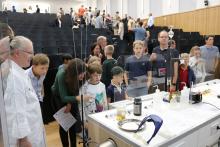
Chemie-Nachwuchs bei "Chemkids"-Preisverleihung an der TUBAF
Meldung vom 11.9.2025
Insgesamt 84 „sehr erfolgreiche“ Teilnehmerinnen und Teilnehmer des "Chemkids"-Experimentalwettbewerbs im vergangenen Schuljahr waren Anfang September an die TUBAF eingeladen und betraten teilweise erstmals einen echten Hörsaal. Die Schulpreise für besonderes Engagement 2024/25 wurden an die 50. Grundschule „Gertrud Caspari“ Dresden, die Oberschule Mockrehna sowie das Martin-Anderson-Nexö-Gymnasium in Dresden verliehen. Auch alle „sehr erfolgreichen“ Teilnehmerinnen und Teilnehmer wurden geehrt, mit Buchpreisen, Experimentierkästen und für die Allerbesten mit Praktikumsplätzen im Schülerlabor an der Hochschule Merseburg bzw. der Universität Mainz. Zum Bericht von der Veranstaltung an der TU Bergakademie Freiberg
Wichtige Berufe hinter den Kulissen der Wissenschaft: TUBAF begrüßt neue Azubis
Meldung vom 2.9.2025
Sechs motivierte Nachwuchstalente starteten am 1. September 2025 ihre Berufsausbildung in der Verwaltung, den Fakultäten und Zentralen Einrichtungen der TUBAF. Vom Fachinformatiker über die Verwaltungsfachangestellten bis zum Industriemechaniker bilden die fünf Ausbildungsberufe wichtige Säulen für eine reibungslose Forschung und Lehre. Nach langer Zeit bildet die Uni erstmals wieder im Beruf Physiklaborant aus. Zudem konnten 5 neue Fachbereiche, wie das Kompetenzzentrum Sächsischer Hochschulen (KSH) gewonnen werden, um ihre eigenen Fachkräfte von morgen selbst auszubilden. Zwei Auszubildende, ein Berg- und Maschinenmann sowie eine Werkstoffprüferin, haben ihre Ausbildung im Jahr 2025 erfolgreich beendet. Mit dem neuen Jahrgang bildet die Universität nun insgesamt 22 Auszubildende aus.
„Wer die TUBAF als Ausbildungsbetrieb wählt, erhält nicht nur eine praxisnahe Ausbildung auf höchstem Niveau, sondern auch Einblicke in die Forschung und Lehre", erklärt Personaldezernentin Katrin Porrmann.
Den Auftakt bildete die offizielle Begrüßung der Azubis und ihrer Ausbilderinnen und Ausbilder in der Aula des Hauptgebäudes durch die Personaldezernentin und ihre Mitarbeiterinnen. Danach erfolgte eine Azubi-Rallye durch das Universitätshauptgebäude, weiter über das Unisportzentrum bis zur Mensa mit einem gemeinsamen Mittagessen, um einen kleinen Überblick über die Uni außerhalb ihrer Bereiche kennenzulernen.
Du willst auch Azubi an der TUBAF werden? Dann informiere Dich jetzt zum Ausbildungsstart 2026.
New professor for drilling technology and well completion
1.9.2025
From TUBAF to industry and back again: Professor Ulf Kirsten is following in the footsteps of Professor Matthias Reich at the Faculty of Geosciences, Geotechnical Engineering, and Mining – known as Germany's only professor of deep drilling technology and active with his own YouTube channel. With the new appointment, the professorship has been renamed the Chair of Drilling Technology and Well Completion. Professor Ulf Kirsten will take up his post at the Institute of Drilling Technology and Fluid Mining on September 1, while Professor Matthias Reich will retire in October.
Ulf Kirsten is an alumnus of the TU Bergakademie Freiberg and completed both his studies and his doctorate at his alma mater. He is delighted to be returning to Freiberg: “The field of the professorship is currently undergoing profound change in terms of both the technologies used and the objectives of drilling. The core topic will be the efficient and sustainable exploitation of resources.”
In his teaching, the engineer aims to combine traditional drilling technology with the complex field of energy resource supply. “Collaboration is essential in drilling today; tasks must be viewed holistically—and I want to teach students the skills they need to do that!” At TUBAF, Professor Ulf Kirsten sees excellent conditions for combining geology, geotechnical engineering, mechanical engineering, automation, and computer science in teaching.
Before and after completing his doctorate, the expert in tunnel construction and underground drilling gained around fifteen years of experience in various international construction companies. "From my time in industry, I take with me above all the determined solution of ambitious tasks. Always in contact with the specific application or with a clear reference to technology, whether above or below ground. The opportunity to do this now with a competent team – and with the students – at the TU Bergakademie Freiberg opens up many new and exciting possibilities.
Math talents from all over Europe visit TUBAF
30.9.2025
The pressure was off already for 66 math talents from 11 countries: Participants in the European Math Olympiad MEMO arrived in Freiberg on Friday (August 29) feeling relaxed. The boys and girls had previously completed several challenging exams and tests at Chemnitz University of Technology. In addition to MEMO organizer Professor Daniel Potts (Chemnitz University of Technology), TUBAF mathematician Professor Ralf Hielscher is also involved in organizing the Math Olympiad. For the leisure program, the participants headed to Freiberg – first to terra mineralia and then to the TUBAF research and teaching mine. In the afternoon, they listened to exciting lectures, for example on “Symmetry vs. order at infinity” by TUBAF professor Martin Schneider.
In 2025, the 19th Middle European Mathematical Olympiad took place in the European Capital of Culture. The competition was organized by the Faculty of Mathematics at Chemnitz University of Technology.
Sächsischer Wirtschafts- und Bergbauminister trifft neue TUBAF-Rektorin zum persönlichen Austausch
Meldung vom 28.8.2025
Professorin Jutta Emes begrüßte Staatsminister Dirk Panter am 27. August an der TU Bergakademie Freiberg. Im Mittelpunkt des Gesprächs standen die Vorbereitungen zur Rohstoffkonferenz, die im Januar 2026 an der TUBAF stattfinden wird sowie aktuelle Projekte und Forschungsansätze.
„In Sachsen aber auch darüber hinaus agiert die TUBAF in einer besonderen Rolle zur Lösung von Zukunftsfragen rund um Rohstoffe, Kreislaufwirtschaft und nachhaltige Technologien. Den Austausch zu aktuellen Forschungsthemen und zur weiteren Entwicklung der TUBAF mit dem sächsischen Staatsministerium für Wirtschaft, Arbeit, Energie und Klimaschutz wollen wir künftig noch weiter intensivieren“, so Professorin Jutta Emes beim Antrittsbesuch des Ministers. Weitere Anknüpfungspunkte ergeben sich bei der Fachkräftegewinnung für den Freistaat Sachsen sowie im Forschungstransfer und bei Unternehmensgründungen.
Mit ihrer Forschung entlang der gesamten Rohstoff-Wertschöpfungskette trägt die Freiberger Universität entscheidend zur Zukunft des Bergbaus bei. „Die TU Bergakademie Freiberg ist als nationale Ressourcenuniversität unverzichtbar für den Rohstoff- und Innovationsstandort Sachsen“, betonte Staatsminister Panter.

TUBAF-students get involved at the „World Space Week“
21.8.2025
TUBAF students studying space resources explain to interested children how resources will be extracted on the moon in the future. This year's MEKi day on October 4, 2025, with the theme “Living on the moon,” will take place at ega Park Erfurt. MEKi stands for Moon Expedition for Kids and is aimed specifically at families with school-age children.
At the event organized by Deutsche Gesellschaft für Luft- und Raumfahrt as part of “World Space Week,” the TUBAF team will be in charge of the “Working on the Moon” station: In a sandbox with free-flowing granulate, visitors can test their driving skills on the moon with a remote-controlled rover model. In addition, the team will provide insight into current research in a lecture entitled “Life on the Moon and Mars with local raw materials?!”. Further Informations
Spectacular amethyst specimen from the Ore Mountains arrives at terra mineralia
5.8.2025
On August 1, a rainy Friday, there was nevertheless a ray of hope at the terra mineralia exhibition in Freiberger Schloss Freudenstein: in the afternoon, a brand-new display case manufactured by display case manufacturer Schreiber in Geyer was delivered to its location. The reason for the new display case is the arrival of a spectacular amethyst specimen, which arrived in Freiberg shortly after the display case. The crystal specimen, weighing almost 100 kilograms, was carefully lifted into the display case so as not to damage the precious item or the new display case. “The specimen comes from Seidelgrund near Wiesenbad in the Saxon Ore Mountains,” explains curator Andreas Massanek. “The previous owner had it professionally cleaned and removed the brown iron oxides. Now the specimen shines in snow white and violet. This is because the amethyst is overgrown with white, artichoke-like quartz – an incredible color contrast, especially since the amethyst crystals still have red-colored tips due to hematite.”
Seidelgrund is a classic site that has been known since the 16th century. The material was used to make many pieces of jewelry, which can be admired in the Green Vault in Dresden. The amethyst cluster is completely undamaged and surpasses all other clusters in the collections in terms of quality and aesthetics. The specimen and the display case were financed by the Günter Heinisch Foundation, which was founded ten years ago by the Association of Friends and Sponsors of the TU Bergakademie Freiberg e.V.
This specimen is intended to draw the attention of visitors to terra mineralia, where almost all of the minerals on display are from abroad, to the beauty of minerals from Germany. Perhaps this will also encourage them to visit the Mineralogical Collection Germany exhibition in the Krügerhaus.
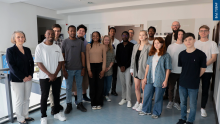
Successful completion of preparatory college: certificates for 11 international prospective students
25.7.2025
On July 25, 2025, eleven international graduates successfully completed their studies at the TU Bergakademie Freiberg preparatory college and received their certificates. This means that they have passed the assessment test and obtained the university entrance qualification required to study in Germany. The prospective students come from Mozambique, Uzbekistan, Kazakhstan, Ukraine, and Russia. Starting in the 2025/26 winter semester, they will begin their studies at TUBAF in fields such as geotechnical engineering, chemistry, applied computer science, space resources, and process engineering.
During the one-year preparatory course, participants received intensive instruction in German, mathematics, physics, chemistry, and computer science. They also took part in tutorials, excursions – for example, to the Reichen Zeche coal mine or the recycling company Luxchem – and regular lectures. The preparatory college is located at the International University Center (IUZ) and is run in close cooperation with several faculties.
The next T-course at the preparatory college will begin on September 18, 2025, with the entrance exam.

Nomadic Children team returns from second Mongolia project trip
23.7.2025
The Nomadic Children team returned from its second trip to Mongolia on July 20, 2025. This time, the focus was on visits to educational institutions in rural areas, but also on the official presentation of the project at the Goethe-Institut Ulaanbaatar, where the foundation for future cooperation was laid. TUBAF has been committed to scientific and cultural exchange with Mongolia for many years. With the Nomadic Children project, the university supports schools in rural areas of the country with the aim of introducing children and young people to scientific knowledge. This time, the trip also took the team to the Gobi Desert. To the team's report.
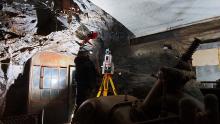
International cooperation underground: practical measurement course for students
21.7.2025
From 14 to 17 July, an innovative practical measurement course took place at the Dreibrüderschacht in Freiberg to advance the digitization of underground facilities. The project was carried out in close cooperation between the Saxony Mining Authority, the Dreibrüderschacht development association, TS Bau GmbH and the TUBAF Institute for Mine Surveying and Geodesy. The aim of the internship was to enable visitors to experience the underground features, such as the machine cavern in the Rothschönberg gallery, using mixed reality.
Around 20 Polish students from the AGH University of Science and Technology in Krakow were part of the program. State-of-the-art technologies were used: the participants used a combination of laser and image scanning as well as the innovative process of Gaussian splatting to create photorealistic 3D worlds - comparable to video games, but with a real background. The collaboration underlines the importance of international cooperation in the field of mining and geotechnical research.
Erasmus + Projekt
Das Messpraktikum hat eine über 20-jährige Tradition und wurde bislang überwiegend in der Reichen Zeche sowie im vergangenen Jahr in der Grube Tannenberg im Vogtland durchgeführt. Mit diesem Vorhaben setzte das Team auf den Einsatz modernster Technik und innovativer Methoden, um die Zukunft des Bergbaus digital erlebbar zu machen. Das Projekt wird in Polen durch Erasmus+ gefördert.
Liaison office celebrates its first anniversary - aptitude tests for prospective Mongolian students completed
18.7.2025
On July 15, 2025, six Mongolian prospective students took part in the entrance test for the Studienkolleg at TU Bergakademie Freiberg. German language skills and basic mathematical knowledge were tested. If the applicants pass the tests (evaluation still pending), they will begin their studies at the TU Bergakademie Freiberg in the coming winter semester. The mechanical engineering, process engineering and chemical engineering, geoinformatics and geophysics, chemistry and computer science courses are particularly in demand.
The examinations were organized by the TUBAF liaison office in Ulaanbaatar, which can look back on a year of successful work this summer. Since July 2024, the liaison office has been supporting prospective students from Mongolia with their application, preparation and arrival in Saxony. With the liaison office, TU Bergakademie Freiberg is strengthening the long-standing scientific and cultural relations between Saxony and Mongolia and making a contribution to the targeted recruitment of skilled workers for Saxony as a science and business location.
From research to market-ready innovation
The TUBAF spin-off CYNiO GmbH receives over 2 million euros in growth capital from an investment by bmp Ventures with the IBG Innovation Fund and the TGFS Technologiegründerfonds Sachsen. The chemical start-up intends to use this to scale up its CO₂-based, phosgene-free technology for the production of isocyanates and expand its product portfolio. The investment is not only a strong signal for the start-up location of Central Germany, but also for the strength of Saxony's technology transfer from science to industrial application. As a spin-off from the Institute of Inorganic Chemistry at TU Bergakademie Freiberg, CYNiO 2025 was founded by Michéle Tille (CEO), Marlene Baumhardt (CPO) and Sophie Riedel (COO).
The founding team has been advised by TUBAF's own start-up network SAXEED since 2020 and gained entrepreneurial qualifications at an early stage as part of various SAXEED programs:
- In the SAXEED exploitation school, the founders developed initial strategies for transferring their research into marketable business models.
In the EXIST boot camp, with the aim of preparing the EXIST application in a results-oriented and plannable manner and exchanging ideas with other start-up teams during the application process.
Participation in the SAXEED Masterclass, the 12-month early-stage incubator for start-up projects with EXIST funding. It combines a structured coaching roadmap, intensive exchange between the start-up teams and regular feedback from the expert jury.
Find out more
Delivery robots in rural areas - can design boost acceptance?
10.07.2025
Will the acceptance of delivery robots increase if they bring supermarket orders as a colorful mini-fridge instead of a moving grey box? The mobile exhibition “Pop Up Science - Rosee on the Road”, which can currently be seen in various locations, shows appealing designs. The focus is on a delivery robot developed at the TU Bergakademie Freiberg, which is intended to support older people and secure local supplies in rural areas.
Next (and last) stop of the roadshow is at Offspace Kaisitz, Kaisitz 3, 01665 Käbschütztal - 18.07.2025, 3 pm
Visitors to the exhibition "Arrive. Deliver. Think differently" experience prototypes, animations and design concepts - and get into conversation with researchers and designers. “In the future, it won't just be us wearing fashion - we'll be designing it for machines that live, feel and express themselves with us,” says Wiete Sommer, artistic director of the project.
The mobile exhibition is being realized as part of the transfer format “4transfer” by the Landesverband der Kultur- und Kreativwirtschaft Sachsen e.V. (Saxony State Association of Cultural and Creative Industries). For TUBAF Professor Sebastian Zug, Chair of Software Technology and Robotics, the collaboration is an example of how technology and design can shape the future together.
The exhibition is part of a joint research project between the TU Bergakademie Freiberg and the Brandenburg University of Technology Cottbus-Senftenberg. The aim is to test autonomous delivery systems for use on footpaths and cycle paths.
Using water sustainably: Networking and knowledge transfer for alumni of German universities in Johannesburg
Meldung vom 7.7.2025
"300 million people in Africa have no access to clean drinking water. Water availability fluctuates regionally and seasonally - from periods of drought to floods. Population growth and rising water demand are increasingly leading to conflicts of use. The African-German dialog enables a valuable exchange of knowledge, experience and solutions," says Professor Jan C. Bongaerts from the TU Bergakademie Freiberg (TUBAF). Together with the Director of TUBAF's International Office, Juliia Sishchuk, he led a seminar on sustainable water use in Africa, which took place at the university in Johannesburg at the beginning of July. The DAAD (German Academic Exchange Service) supports the exchange in the “SDG Alumni Projects: Knowledge and Practice for Development” program.
The participants from 18 countries on the continent have studied at universities and research institutions in Germany, completed their doctorates or conducted research as postdocs. “The seminar opens up new perspectives for joint educational and research activities,” reports Professor Antoine F. Mulaba (University of Johannesburg). “This is the second time we have co-organized an alumni seminar in collaboration with TU Bergakademie Freiberg.”
Participant Mushany Kapusana, technical advisor in the water sector in Zambia, was impressed by the intensive networking at the event: “In particular, I learned how to use AI-based early warning systems to better identify water contamination so that preventative measures can be introduced in a more targeted manner.”
“The seminar has given me concrete ideas for my teaching and research,” says scientist Ernestina Annan from the Kwame Nkrumah University of Science and Technology (Ghana). She is working on the effects of land use changes on climate change and the availability of water resources.
Stimmen aus dem Workshop
Teilnehmer Mushany Kapusana, technischer Berater im Wassersektor in Sambia, zeigt sich beeindruckt vom intensiven Networking im Rahmen der Veranstaltung: „Insbesondere lernte ich mit KI-basierten Frühwarnsystemen Wasserverunreinigungen besser zu erkennen, um präventive Maßnahmen gezielter einleiten zu können.“
„Aus dem Seminar nehme ich konkrete Impulse für meine Lehre und Forschung mit“, sagt Wissenschaftlerin Ernestina Annan von der Kwame Nkrumah University of Science and Technology (Ghana). Sie beschäftigt sich mit den Auswirkungen von Landnutzungsänderungen auf den Klimawandel und die Verfügbarkeit von Wasserressourcen.
Strengthening STEM women's networks at TUBAF partner universities in sub-Saharan Africa
4.7.2025
Eleven female scientists and five male scientists are returning from Freiberg to their home universities in Nigeria, Kenya and Ghana this week as trainers for sustainable research and teaching. The participants in the YEMAYA project workshop research and teach at the partner universities and are now promoting women's networks in STEM disciplines there.
Using a train-the-trainer approach, the Erasmus mobility program teaches in particular techniques for biodiversity management, water and soil monitoring and purification, and climate protection. As all participating universities are located in major mining countries, a key objective was to expand their expertise in the sustainable extraction of mineral resources. To support this goal, the visiting researchers were introduced to TUBAF's modern research infrastructure, including the facilities of various specialized institutes and the Reiche Zeche research and training mine. This enabled them to gain in-depth insights into current technologies and methods of sustainable raw material extraction and mining waste management.
To this end, the participating African universities have founded the “YEMAYA Village”, where they now want to implement the project recommendations and research work. The long-term goal of the project is to promote social change and sustainable development in rural regions of sub-Saharan Africa. In addition to TU Bergakademie Freiberg, the universities involved are the University of Nigeria, Nsukka (UNN), Machakos University, Kenya (MU), Taita Taveta University, Kenya (TTU), University of Mines and Technology, Ghana (UMaT); and the University of Environment and Sustainable Development, Ghana (UESD).
"Scientific diving: TUBAF trains for underwater research
2.7.2025
The Scientific Diving Center (SDC) at TU Bergakademie Freiberg is once again hosting training camps in scientific diving. The SDC is one of the few institutions in Germany that provides methodologically sound training for underwater research - interdisciplinary, practical and internationally recognized.
The training is aimed at students and researchers, as well as external specialists, and includes sediment and water sampling, surveying, 3D photogrammetry and emergency management. The SDC is the first center in the world to be certified according to the new ISO 88041/-42 standard, which it helped to develop. It stands for the highest standards in methodology, safety, equipment and diving medicine.
Applications range from geology and environmental research to archaeology, forensics and infrastructure monitoring. The police and other educational institutions also make use of the centre's expertise.
Resource-efficient glass production: Sindy Fuhrmann appointed to professorship for energy- and raw material-efficient glass technology
1.7.2025
Tenure sucessfully comleted: Following a positive evaluation of her work, Sindy Fuhrmann was appointed to a regular professorship at the WISNA Tenure-Track Program of the TU Bergakademie Freiberg as of July 1. Since March 2020, the alumna of the TUBAF has been researching at the Institute for Glass and Glass Technology how glass can be produced, processed and recycled in a resource-efficient manner.
Further scientific focuses of the engineer include additive manufacturing and the structural characterization of amorphous materials (glass), particularly under extreme pressures. At the European Synchrotron Radiation Facility (ESRF), Professor Sindy Fuhrmann is investigating structural changes in glasses and melts under pressures up to 120 gigapascals and high temperatures using modern X-ray and Raman spectroscopy ("ECXXOR"). The research group, which is affiliated with the Recomine network, proposes innovative recycling methods for glass fibers in composite materials or water glass from production residues in the VeharstGlas research project. In the ESF Early-Stage Researcher Group QualiGlas, two doctoral students at her professorship are investigating how new melting technologies affect glass quality.
As a study dean, Professor Sindy Fuhrmann is committed to the study program Ceramic, Glass and Building Materials Technology.
Further information: Linkedin / interner Bereich
Tenure-Track-Programme at TU Bergakademie Freiberg
The WISNA tenure-track program gives young researchers the opportunity to embark on a predictable academic career at an early stage. In doing so, the university is following the recommendation of the German Council of Science and Humanities for a cultural change in the promotion of young academics based on the Anglo-American tradition.
3D tactile models for an inclusiv Chemnitz park experience
20.6.2025
The Schilling Figures at the Chemnitz Castle Pond are considered the most valuable sculptures of the 19th century in Saxony - for visually impaired people in Chemnitz, their intricate details were previously inaccessible. Now, the Chair of Additive Manufacturing at the TUBAF, in collaboration with students from the Agricola Gymnasium Chemnitz and on the initiative of the Arbeiter-Samariter-Bund Chemnitz, has created 3D tactile models of the impressive figures. Using 3D scanners, the students scanned the figures, and the data was then processed and 3D printed in the laboratory by the Chair of Additive Manufacturing under the leadership of Professor Henning Zeidler. The Dresden company PTZ also supported the project with an additional 3D printed set of the figures. In mid-June, the tactile models were handed over and first used for a city tour as part of the Kosmos Festival. The project makes a significant contribution to barrier-free access and an inclusive society.
TUBAF Honorary Badges for Outstanding Commitment awarded
19.6.2025
Traditionally, the Rector of the TU Bergakademie Freiberg awards honorary badges to individuals who have made a significant contribution to the university. On June 18, 2025, the university presented a total of ten of these awards to staff members, two to former employees, and one to a person outside the university. The staff members receiving the honorary badges are Cornelia Brückner, Dr. Andrea Dög, Heike Hoffmann, Dr. Ulrike Mörters, Dr. Dirk Renker, Dr. Sabine Schellbach, Uwe Schellbach, Simone Schmiedel, and Dr. Kristina Wopat, as well as former employee Dr. Jürgen Weyer and Emeritus Professor Jens-Uwe Götze. Students Dirk Damaschke and Martin Ade were also honored for their exceptional commitment to the Student Council and the Wood´n´Brass Big-Band of the TUBAF.
"All the awardees deserve our heartfelt thanks," said Professor Klaus-Dieter Barbknecht, Rector of the university. "The TUBAF benefits from their work and their commitment to our university."
Philipp Preißler, Head of the Mayor's Office and member of the Board of Directors of the Studentenwerk Freiberg, received a silver honorary badge as a person outside the university. "Through his personal commitment, Philipp Preißler makes a significant contribution to the good cooperation between the city and the university," said Klaus-Dieter Barbknecht during the award ceremony."
Raw materials for reconstruction in Ukraine
17.6.2025
Professional exchange and a sign of solidarity: at the end of May, a conference was held at Freiberg's partner university, Dnipro University of Technology, on the topic of “Raw materials for the reconstruction of Ukraine”. Participant Professor Carsten Drebenstedt reports: "TU Bergakademie Freiberg continues to stand firmly by its Ukrainian partners and supports education and research, especially in difficult times. We have great respect for the achievements of the Ukrainian people and hope for peace soon."
During a tour of the university with Vice-Rector Artjom Wolodimirovich Pawlishenko, Professor Drebenstedt was able to see for himself the ongoing efforts to modernize the teaching and research infrastructure. For example, new laboratories for robotics, virtual reality and energy technology are being created: "I was very impressed by how Ukraine is investing in education and research in times of crisis, not only by the government but also by private companies. Ukraine is currently launching a targeted research program for universities. The partner university in Dnipro can now cover most of its own electricity needs from solar power with electrical storage - a good and clean solution, and not just in times of frequent blackouts - we can still learn a lot from that!"
In addition to the professional exchange on many topics that are also relevant at Freiberg University, Professor Drebenstedt took the opportunity to hand over a set of the new reference book “Handbook for Mining Engineers”, which allows access to extended content via an app.
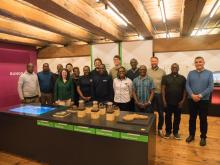
3D printing with rice husks - current research on display at terra mineralia
11.6.2025
In a newly designed area of the introduction to terra mineralia, the mineral exhibition at TU Bergakademie Freiberg, visitors have been able to find out what 3D printing can do since the beginning of June. The focus is on workpieces that are being developed from local agricultural residues in a current research project with Kenyan partners. ‘We have analysed more than fifteen waste materials in the laboratory. Processed into powder, we can test them in 3D printing and thus identify completely new uses for local waste materials,’ said project manager Professor Henning Zeidler at the exhibition opening.
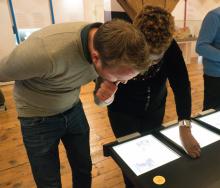
Visitors can feel what rice husks, water hyacinth or macadamia nut shells feel like when they are moulded using the innovative 3D printing process. The exhibits include complex figures, such as a small elephant as a design product. However, there is also potential for the sustainable materials to be used as packaging material, in agriculture and in furniture construction.
A video explains the path of the materials from harvesting and drying to the powder that is used for printing. Pull-out slides provide further information on the residual materials, the scientific work in the 3D printing laboratory and the scientific exchange in the project, the innovative processes, the construction of the pilot plants in Kenya and the economic potential for agricultural production in Kenya.
Der neu gestaltete Bereich im Dachgeschoss kann zu den regulären Öffnungszeiten und Eintrittspreisen der terra mineralia besucht werden.
About the research project
The core idea of the ‘SustainAM’ research project is to utilise waste from local agriculture and production, which is abundant and inexpensive in Kenya, as a raw material for additive manufacturing. This technology, known as 3D printing, offers great potential for the development of biodegradable, environmentally friendly and affordable products. In the long term, this could establish a local circular economy and contribute to economic stability and growth in Kenya. The project partners are the TU Bergakademie Freiberg, Chair of Additive Manufacturing, and the Jomo Kenyatta University of Agriculture and Technology (JKUAT, Juja, Kenya).
The project is funded by the German Federal Ministry of Research, Technology and Space and the German Academic Exchange Service.
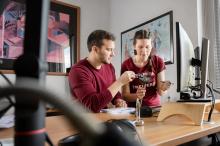
New research ranking: TUBAF among best 7,5% worldwide
2.6.2025
TUBAF researchers score highly with the number and quality of their scientific publications, which are referenced very frequently. As a result, TU Bergakademie Freiberg once again achieved an excellent position in the World University Ranking CWUR 2025. With 67.7 points, TU Bergakademie Freiberg is among the world's best 7.5 percent of the 21,462 participating universities. The QS World University Ranking 2024 even puts TUBAF in first place in Germany in the citations category.
CWUR World University Ranking
The Center for World University Rankings CWUR in the United Arab Emirates evaluates universities on the basis of seven indicators. Research performance accounts for a total of 40 percent and examines both the number of citations and the total number of publications, as well as their shares in high-ranking journals and particularly influential journals. The quality of teaching, the organization of the faculties and the question of which positions alumni hold are also included in the assessment. TU Bergakademie Freiberg was assessed exclusively in the category of research performance in 2025. The evaluation is calculated according to a points system from 0 to 100.
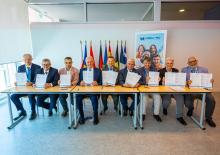
Milestone reached: EURECA-PRO on the way to a legal entity
23.5.2025
In May, the rectors of the nine partner universities of the European University Alliance EURECA-PRO signed a declaration of intent to establish a legal entity for the Alliance. This step is a milestone in the ongoing institutionalization of EURECA-PRO and paves the way for a more integrated and sustainable framework of cooperation. By declaring the creation of a legal entity, the Alliance, of which TUBAF is a member, underlines its commitment to a shared vision for the future of European higher education. The future legal entity will provide a robust governance structure that facilitates joint decision-making, ensures accountability and promotes strategic alignment between the partner institutions. It will serve as a mechanism to deepen cooperation between the partner universities in education, research and innovation, while EURECA-PRO itself can operate more efficiently and autonomously as an independent organization within the European Education Area.
Once a year, the members of the various working groups within EURECA-PRO meet for a review week at one of the partner universities - in 2025 in Nancy, France, at the Université de Lorrain.
15 scholarships awarded at ZeHS
21.5.2025
Yesterday, another 15 students received their certificates for funding in the Interdisciplinary Scholarship Program of the ZeHS. With this scholarship, the OTTO-RITTER-STIFTUNG in the Stifterverband supports high-performing and committed students in higher semesters. In addition to personal financial support of 208 euros per month, funds are available for joint activities. Last semester, for example, the scholarship holders organized an excursion to the ArcelorMittal steelworks in Eisenhüttenstadt.
“We are extremely pleased about the ongoing support from the donors and are very grateful to them. In this way, students who are researching ZeHS topics from different disciplines come into contact with each other. This results in great added value in terms of interdisciplinary learning at the university, also with regard to further academic qualification, for example as part of a doctorate,” says Prof. Dr. Dirk C. Meyer, Academic Spokesperson of the ZeHS.
The scholarship is being awarded for the third time at TU Bergakademie Freiberg. A total of 23 students are benefiting or have benefited from the scholarship program.
Kunst trifft Wissenschaft – Künstlergespräch und Ausstellung im ZeHS regen zum Perspektivwechsel an
Meldung vom 15.5.2025
Was verbindet künstlerisches Schaffen mit naturwissenschaftlicher Forschung? Dieser Frage widmete sich am vergangenen Dienstag (14. Mai 2025) eine besondere Veranstaltung im Zentrum für effiziente Hochtemperaturstoffwandlung (ZeHS) der TU Bergakademie Freiberg. Im Rahmen eines Künstlergesprächs kamen der Maler und Performance Artist Walter Maria Padao, Julius Nordheim (Universitätskommunikation) sowie Professor Helmuth Albrecht (ehem. Direktor des Instituts für Industriearchäologie, Wissenschafts- und Technikgeschichte an der TU Bergakademie Freiberg) in einen regen Austausch über Parallelen zwischen künstlerischen und wissenschaftlichen Verfahrensweisen. Anlass war die aktuelle Ausstellung von Walter Padao im ZeHS sowie eine vorangegangene Performance, die der Künstler gemeinsam mit weiteren Akteurinnen und Akteuren im Februar im Forschungsbau realisierte. Im Zentrum des Gesprächs stand das Nachdenken über Wandlungsprozesse, Zeitlichkeit und räumliche Bedingungen – Themen, die sowohl in der Kunst als auch in der Wissenschaft zentrale Rollen spielen.
„Gerade Formate wie dieses sind es, die lebendige Wissenschaft ermöglichen“, betont Professor Dirk Meyer, Wissenschaftlicher Sprecher des ZeHS. „Sie eröffnen neue Sichtweisen auf Erkenntnisprozesse, schaffen Raum für Selbstreflexion und machen deutlich, wie viel Offenheit, Experiment und Interpretation sowohl Kunst als auch Naturwissenschaft auszeichnet. Für unsere Universität ist das ein wichtiger Impuls für die Weiterentwicklung unserer Universitätskultur.“
Die Veranstaltung machte deutlich, dass die wissenschaftliche Versuchsanordnung und das künstlerische Experiment mehr verbindet als trennt – beides sind Wege, die Welt zu beobachten, zu hinterfragen und neu zu denken. Auch die räumliche Verortung der Ausstellung im Forschungsbau wurde als bewusst gesetzter Bruch mit tradierten Präsentationsformen diskutiert: eine Einladung zum Perspektivwechsel und zur intellektuellen Auseinandersetzung mit dem eigenen Arbeitsumfeld.
Mit dem Künstlergespräch setzt die TU Bergakademie Freiberg ein Zeichen für interdisziplinären Austausch und die Öffnung wissenschaftlicher Räume für kulturelle und gesellschaftliche Debatten – weitere Veranstaltungen in diesem Spannungsfeld sind bereits in Planung.
Minerale und High-Tech aus Freiberg neben sächsischer und internationaler Kunst
Meldung vom 14.5.2025
Zehn Minerale der Geowissenschaftlichen Sammlungen der TUBAF reisten nach Berlin, in die Sächsische Landesvertretung der Hauptstadt. Sie sind dort Teil einer ambitionierten Ausstellung, die von der Künstlerin und TUBAF-Alumna Susanne Roewer kuratiert wird und seit Ende April 2025 für Besucherinnen und Besucher offen ist. Unter dem programmatischen Titel „Wir können mit dem Erfinden nicht aufhören, denn wir sitzen nun einmal auf dem Tiger“ stellt die Kuratorin, die auch die deutsch-polnisch-schweizerische Kooperation für den Roten Turm in Chemnitz initiiert hat, Menschen und Programme in den Fokus, die sich den Problemen der Gegenwart modern, innovativ, eigenverantwortlich und mutig nähern, um den „Durchbruch zum Besseren“ zu schaffen, so der Untertitel der Veranstaltung. Susanne Roewer geht es nicht allein darum, die Vielfalt der Kunst mit Bezug zu Sachsen darzustellen, sie schlägt auch die Verbindung zu technischen Innovationen, die von hier ausgingen: Angefangen bei der Entwicklung des Eisengusses im 18. Jahrhundert in Wolkenburg beleuchtet sie z.B. auch die erfolgreichen Gründer Palitzsch und Röver von LuxChemTech, dem Freiberger Recyclingunternehmen, die ebenfalls Absolventen der TUBAF sind.
Eröffnet wurde der künstlerisch-wissenschaftliche Austausch, bei dem neben den Mineralien aus Freiberg auch 29 Skulpturen, Zeichnungen und Gemälde zu sehen sind, die diesen mutigen Erfindergeist sichtbar machen, am 29. April vom Chef der Sächsischen Staatskanzlei Dr. Andreas Handschuh. Vor Ort waren auch zahlreiche Gäste der TUBAF.
Nach dem Start in der Sächsischen Landesvertretung in Berlin soll die Schau auch nach Freiberg an die TUBAF kommen. Ort und Zeit stehen noch aus, werden aber rechtzeitig über die TUBAF-Kanäle veröffentlicht.
Die Ausstellung in der Sächsischen Landesvertretung ist bis 17. August 2025 täglich von 10 bis 18 Uhr zu sehen, außer bei geschlossenen Veranstaltungen. Der Eintritt ist frei.
Adresse: Vertretung des Freistaates Sachsen beim Bund, Brüderstraße 11/12, 10178 Berlin.
Schirmherren des Projekts sind neben dem Esche Museum und Museum Schloss Wolkenburg die Freunde und Förderer der TU Bergakademie Freiberg.
Aktionstag „genialsozial" am 24. Juni - Teilnahme für Schülerinnen und Schüler an der TUBAF noch möglich

Meldung vom 9.5.2025
Die TU Bergakademie Freiberg nimmt auch 2025 wieder am Aktionstag „genial sozial“ teil. Begleitet von Mitarbeiterinnen und Mitarbeitern der Universität tauschen Schülerinnen und Schüler am 24. Juni 2025, dem letzten Dienstag vor den Sommerferien, für einen Tag die Schulbank gegen einen Job an der TUBAF ein. So unterstützen sie zum Beispiel im Labor bei der Herstellung von Proben und Auswertung von Messverfahren oder im Archiv, der Studienwerbung oder in Sekretariaten.
Der erarbeitete Lohn wird von der TUBAF direkt an „genialsozial“ gespendet. Die Sächsische Jugendstiftung unterstützt damit soziale Projekte vor Ort in Sachsen und weltweit. „Indem wir Teil dieser Aktion werden, ermöglichen wir einerseits den jungen Menschen, Einblicke in verschiedene Berufsfelder zu erhalten und erste Berufserfahrungen zu sammeln und unterstützen andererseits soziale Projekte“, sagen die Ausbildungsverantwortlichen des Dezernates für Personalangelegenheiten.
Der Tag steht unter der Schirmherrschaft des sächsischen Ministerpräsidenten Michael Kretschmer und ist initiiert von der Sächsischen Jugendstiftung.
Ergänzende Informationen zum Aktionstag | Infos und Kontakt an der TUBAF

New heads of the deaneries at TUBAF
1.5.2025
The new deans and a new dean of TUBAF take up their posts today. There was a re-election at the Faculties of Mechanical Engineering, Process and Energy Engineering and Economics. In the other faculties, there is a change of leadership with the regular faculty elections.
The following leaders were appointed to head the deaneries for the next three years:
- Faculty 1: Prof Marcus Waurick
- Faculty 2: Prof Gero Frisch
- Faculty 3: Prof Jörg Benndorf
- Faculty 4: Prof Andreas Bräuer
- Faculty 5: Prof Olena Volkova
- Faculty 6: Prof Michael Höck
The dean represents the faculty within the university and manages it. The faculty heads are represented by the elected vice deans. The responsibilities are regulated in Section 94 of the Saxon Higher Education Act.
University of Tarkwa new partner in international Master's programme AMRD
On 14 March 2025, the agreement to cooperate with the University of Mining and Technology (UMaT) in Tarkwa, Ghana, on the international Master's programme ‘Advanced Mineral Resource Development’ (AMRD) was signed. The English-language programme focuses on raw materials and mining.
Vice Chancellor Prof. Richard K. Amankwah signed the agreement on behalf of UMaT, while Prof. Carsten Drebenstedt, who is also Dean of Studies for the programme at TUBAF, was present to sign on behalf of TU Bergakademie Freiberg. The third partner, the University of Leoben, was present online with the programme director, Prof. Michael Tost.
The agreement means that UMaT will be able to send students to the Master's programme from the winter semester 2025/2026. After completing their studies in Leoben and Freiberg and successfully defending their Master's thesis at their home university, graduates will receive a triple degree.
UMaT in Ghana is the second partner of the international Master's programme in Africa alongside Taita Tavete University in Kenya. The first agreement in the AMRD programme was concluded in 2012 by the University of Leoben and TU Bergakademie Freiberg with the Technical University of Dnipro in Ukraine. Further partners in Europe and Asia followed - UMaT is now the 13th partner to join the network.
Application by the end of January for the winter semester beginning in the same year
The participating universities have the opportunity to send students to the Master's programme. The group of students is therefore international and there are many effects for professional and personal development during and after the degree programme. The application deadline for the Master's programme is 31 January of each year for the winter semester beginning in the same year. All active partners meet in an international committee to select prospective students.
About Mozambique's raw materials: VBGU association hands over reference work to university library
24.4.2025
Two honorary members of the Freiberg Mining, Geology and Environment Association (VGBU) today handed over a copy of the publication ‘The Geology and Mineral Resources of Mozambique’ to TUBAF. The book by author Dr Siegfried Lächelt was published in 2004. The geologist himself worked in Mozambique for several years and is considered the father of Mozambique's systematic geology.
2022, the Federal Institute for Geosciences and Natural Resources published an updated version. The two-volume publication is the only complex account of the geology, mineral resources and deposits (mining) of Mozambique that has been published on this country. It is therefore both a standard work and a handbook for students of geosciences and mining as well as for investors in mining projects in Mozambique. The updated edition is now available to users of the Freiberg University Library.
About the author
Dr Siegfried Lächelt (born 1931 in Lubiath), who holds a doctorate in geosciences, has published numerous scientific papers on geoscientific and mineral deposit topics. His life's work is largely characterised by research into geoscientific contexts, particularly in Mozambique, and their public presentation. In Mozambique, Dr Siegfried Lächelt was honoured by President Armando Guebuza in 2012 with an honorary diploma for science and technology for his many years of consulting services and activities as a geoscientist.
Stipends for students from Mosambik
The TU Bergakademie Freiberg has close relations with partners in Mozambique, in particular the Eduardo Mondlane University in Maputo. Since 2014, up to 10 scholarship holders per year have been taking part in another programme run by the Mozambican Ministry of Mining. This qualifies them to study at TUBAF(„Freiberg mit e“-Podcast-Episode with Sonia Lucas Mondlane).
Zambian ambassador visits TUBAF
23.4.2025
Her Excellency Winnie Natala Chibesakunda and her delegation were formally received by the Rector of the University, Professor Klaus-Dieter Barbknecht, the Vice-Rector for Research, International Affairs and Transfer, Professor Tobias Fieback, and Professors Helmut Mischo and Carsten Drebenstedt. The ambassador signed the University's Book of Honour. The visit is the first step towards a resumption of closer co-operation between TUBAF and educational institutions in Zambia. Between 1969 and 1991, ten Zambian students graduated from the university. ‘We need a new agreement so that students from Zambia can come to Freiberg again in the future,’ explained Professor Mischo on the sidelines of the event. Winnie Natala Chibesakunda has been Zambia's ambassador since 2023. She holds a doctorate in economics and studied at the Wilkau-Haßlau School of Economics and later in Berlin-Karlshorst and Lusaka (Zambia).
Common goals for transfer and securing skilled labour in the region
18.4.2025
In order to bring companies in the region together with the university, TUBAF is cooperating with the Chemnitz Chamber of Industry and Commerce, Central Saxony Regional Chamber. The partners have defined specific goals and measures for the year 2025 and signed a cooperation agreement in April.
Among other things, the two partners are planning joint events and projects for knowledge and technology transfer. Start-ups and validation projects at TUBAF can also count on the expertise of the IHK. In future, the university's Career Centre will increasingly support the IHK in recruiting specialists for the regional economy.
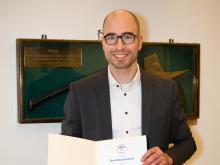
New Professor for Automated and Autonomous Systems
25.3.2025
Professor Robert Weidner will take up the professorship for Automated and Autonomous Systems (AAS) in March. The mechanical engineer with a doctorate, who is moving to TUBAF from the University of Innsbruck, specialises in human-machine systems and automation, both with regard to various areas of application. The new professor's current research focus is on technical systems for physical support in physically demanding activities (body support systems/exoskeletons) as well as automation for various application contexts in professional and everyday life, for example industry, logistics and care.
At TU Bergakademie Freiberg, Robert Weidner wants to work on an interdisciplinary basis and develop new solutions for automation and human-machine systems together with students and colleagues, partners from industry and society, which are socially relevant and of great importance for our competitiveness. ‘The transfer of research into practice is particularly important to me.’
What can students expect from the new Professor of Automated and Autonomous Systems' courses? ‘Students can expect practical courses with a strong focus on interactive and project-based teaching. I don't just want to impart theoretical knowledge, but also enable them to develop innovative solutions in automation and robotics themselves.’
Engineering of Cyber Physical Systems
After completing his doctorate at the Helmut Schmidt University/University of the Federal Armed Forces Hamburg, Robert Weidner worked as a junior research group leader of the interdisciplinary BMBF junior research group smartASSIST of the Federal Ministry of Education and Research. Between August 2018 and February 2025, he was Professor of Production Engineering at the Institute of Mechatronics at the University of Innsbruck.
The Faculty of Mechanical, Process and Energy Engineering is currently appointing several professors as part of its 2025 profiling initiative ‘Engineering of Cyber Physical Systems’, including the professorship for Automated and Autonomous Systems, which has now been successfully filled.
Award for good teaching in geophysics goes to TUBAF
21.3.2025
Geophysicist Dr Jana Börner receives the award for outstanding teaching from the German Geophysical Society. She heads the petrophysics laboratory at the Institute of Geophysics and Geoinformatics and teaches methods of applied and general geophysics, such as petrophysics, borehole geophysics, gravimetry, magnetics and geothermics in lectures and tutorials. As a lecturer, she integrates students into measurement campaigns to an exceptional degree, establishes a close link to her own research practice and encourages students to work independently. The nomination for the teaching award was made by the students themselves. They particularly praised ‘the good structuring of the teaching content, the high level of didactic preparation and the detailed and comprehensible lecture notes’. In its statement, the award jury went on to say: ‘Your modules are perfectly coordinated between lectures, exercises and practicals and are broken up by modern elements such as online quizzes.’
‘I'm delighted that the geophysics students have been honoured - the feedback is both praise and an incentive to continue teaching on an equal footing and together with the students, and to inspire them with current research questions.’
Miteinander sprechen – AGEMERA holt Bürgerinnen und Bürger, Wissenschaft und Bergbauunternehmen an einen Tisch
Meldung vom 17.3.2025
Es war eine der vielfältigen Maßnahmen, mit denen das EU-geförderte Projekt AGEMERA mit den Akteuren und Betroffenen von Bergbauprojekten ins Gespräch kommen will. Am 5. März 2025 luden die Professur für Rohstoffabbau und Spezialverfahren unter Tage der TUBAF zu einer Diskussionsrunde unter der Fragestellung „Abbau kritischer Rohstoffe im Erzgebirge – Was sagen Sie dazu?“ in den Konferenzraum der Neuen Mensa.
Rund 100 Teilnehmende erfuhren nicht nur, warum kritische Rohstoffe so wichtig für unsere Gesellschaft sind – Vertreter verschiedener Bergbaufirmen stellten auch ihre konkreten Projekte im Erzgebirge vor. In der Diskussion kamen sie ins Gespräch mit betroffenen Bürgerinnen und Bürgern. Professor Helmut Mischo, der mit seiner Professur für Rohstoffabbau und Spezialverfahren unter Tage Teil des europäischen Kooperationsprojekts AGEMERA ist, war überrascht von der guten Resonanz der Veranstaltung: „Es waren die Leute vor Ort, die das Thema ganz direkt angeht: Bürgermeister der betroffenen Gemeinden, aber auch Aktivistinnen und Aktivisten von lokalen Bürgerinitiativen.“ Helmut Mischo betont die sachliche Gesprächsatmosphäre des Abends: „In dieser Diskussionsrunde konnten die Beteiligten miteinander sprechen, ohne dass es gleich emotional wurde. Wir Forschenden der an AGEMERA beteiligten europäischen Universitäten verstehen uns als Moderatoren in der oft konfliktreichen Diskussion über Rohstoffgewinnung. Die betroffenen Gemeinden müssen mitgenommen werden, sonst haben Bergbauprojekte ein massives Akzeptanzproblem.“
Nach dieser erfolgreichen Veranstaltung wollen Helmut Mischo und sein Team das Format der Diskussionsrunde weiter fortführen. Eine zweite Veranstaltung ist bereits in Planung.
Hintergrund zu AGEMERA
Bergbau nachhaltig und sozial verträglich gestalten
Mit dem Green Deal der EU haben die Mitgliedsstaaten sich verpflichtet, die europäische Wirtschaft zu modernisieren, nachhaltig und resilient zu gestalten. Die EU soll dabei stärker auf eigene Rohstoffe zurückgreifen, um die Abhängigkeit von anderen Staaten zu verringern. Hierbei hat man insbesondere die so genannten kritischen Rohstoffe im Blick. In der Folge bedeutet dies, dass in Europa zukünftig wieder mehr Bergbau betrieben werden wird. Dieser soll nachhaltig und sozial verträglich gestaltet werden. Das Kooperationsprojekt vereint zwanzig Institutionen aus Wissenschaft, kleinen und mittelständischen Unternehmen und Industriepartner aus elf Ländern. https://agemera.eu/
AGEMERA an der TUBAF
Infos zum Projekt finden Sie hier.
Final Colloquium of Research Cluster on Uncertainties in Nuclear Waste Disposal lead by TUBAF
Over the past three years, TUBAF’s Chair of Soil Mechanics and Foundation Engineering coordinated the URS research cluster in which 18 institutions and over 50 researchers worked together to develop methods for treating uncertainties in preliminary safety analyses of nuclear waste repository systems. The cluster, initiated and funded by the Federal Company for Radioactive Waste Disposal (BGE), aims to support the search for a site where Germany can store the nuclear waste in deep geological layers safely for up to one million years. Comprising of six research projects (RADON, MeQUR, ENSURE, REDUKLIM, Smart Monitoring, and GeoBlocks) the cluster aimed to address the impact of uncertainties in geological, engineering and decision-making aspects.
The TUBAF team also coordinated the research project MeQUR with participation of scientists from TU Chemnitz, the Helmholtz Centre for Environmental Research and the Federal Institute for Geosciences and Natural Resources (BGR). “We cannot – and don’t have to -- predict with pin-point precision how a nuclear waste repository will evolve over one million years. Instead, we extend our calculations such that we can estimate how confident we can be in the results” says the project leader Prof. Dr. Thomas Nagel. The team combined modern mathematical approaches in uncertainty quantification with thermal-hydraulic-mechanical coupled simulations to examine under which conditions geological and geotechnical barriers are able to isolate the nuclear waste safely over long periods of time. Prof. Nagel adds “Uncertainty does not equal unsafe. Communication of such results to the public is therefore another important factor. We developed on intuitive ways to visualize probabilistic simulation results and show what uncertainty really means.”
Final Colloquium held in Potsdam
The final cluster meeting in Potsdam brought together over 50 researchers from all six projects and experts from the Swiss repository programme to present their latest results. Discussions focused on planned and published research outcomes and their application in supporting the site selection process. The event underscored the importance of collaboration across a wide range of disciplines in tackling the complex challenges of nuclear waste disposal.

Joint further development of ‘MTEX’ software: Workshop for geology and materials science
7.3.2025
From 3 to 13 March, 14 scientists will meet at TU Bergakademie Freiberg to discuss current challenges in the modelling and characterisation of polycrystalline materials. The participants from the fields of geology and materials science will be using the open source software MTEX - an analysis tool developed more than 15 years ago by TUBAF mathematician Professor Ralf Hielscher and an international team. The software is used worldwide in industry and research to analyse electron microscopy images in materials science, geology and crystallography and is an example of the interdisciplinary focus of mathematics at TU Freiberg. At the workshop and subsequent conference, users of the software will gather experience and develop the tool further together (detailed programme).
Why artificial intelligence needs maths
6.3.2025
What are neural networks? Why does AI need maths? How does mathematics enable visualisation in a virtual reality? These are some of the questions that sixteen students have been working on at the Spring Academy at TUBAF. In the first week of March, they are studying maths ‘on trial’ and learning about numerous applications of mathematics.

The lecture by Prof Björn Sprungk (Chair of Applied Mathematics) is about artificial neural networks that solve AI tasks such as face or character recognition. In contrast to earlier expert systems that worked with hard-coded rules (e.g. chess programmes), these systems generate their own rules for recognition by evaluating a large amount of training data (machine learning). ‘It is now important to know how this rule generation can be described mathematically: The lecture will show that a suitable, barely visible change to an image can cause false recognition,’ explains Dr Uwe Weber, one of the organisers of the Spring Academy. ‘The mathematical understanding of such correlations makes us aware of the problems and limitations of AI, but can also enable us to construct more robust AI systems in the future.’
Participant Hannah (in the photo on the right) says: ‘AI imitates what our human brain does, i.e. how neurons pass on information about stimuli. But we learned a lot more about the applications of maths - so I would definitely recommend the Spring Maths Academy to others.’ Participant Iris (left in the photo) was particularly surprised ‘that there are natural numbers that we can't calculate - I didn't know that yet’.
In May, the maths department offers another taster course for pupils - the Probeuni.
Hintergrund: Projektwoche für Mathematikinteressierte
Die Frühjahrsakademie Mathe ist ein Angebot zur Studienorientierung der TU Bergakademie Freiberg. Angemeldet haben sich 16 Schülerinnen und Schüler aus Sachsen, Thüringen und Brandenburg.
Die Projektwoche wird bereits seit 1993 von der Fakultät für Mathematik und Informatik veranstaltet. Seit langem finden die Frühjahrsakademien jährlich nach dem Wintersemester statt.
Neben Vorlesungen und Übungen zu spannenden mathematischen Themen bieten sich auch viele Gelegenheiten, mit Studierenden und Mitarbeitenden der Uni ins Gespräch zu kommen und das studentische Leben, die Stadt und die Anforderungen eines Mathestudiums kennenzulernen.
Significant support for the reconstruction of the universities in the 2000s: TUBAF receives Order of Merit of the Republic of Kosovo
27.2.2025
‘The first talks took place under the escort of KFOR soldiers due to the still very critical security situation in Kosovo at the time. The University of Pristina lacked any functioning infrastructure,’ recalls Emeritus Professor Heinrich Oettel. One focus was the establishment of a central laboratory unit (CLU) for materials science at the University of Pristina. After the necessary equipment and facilities had been transported from Germany to Prishtina under the most difficult conditions, the CLU was opened in 2003. ‘Around 450,000 euros, financed by the HRK (German Rectors‘ Conference), the Federal Foreign Office and the DAAD, were invested in the laboratory,’ says Professor Heinrich Oettel. Two years later, the planned ‘Materials Science and Technology Network’ was officially formalised.
Numerous students, doctoral candidates and researchers benefited from study and guest stays at TU Bergakademie Freiberg and from the facilities at CLU. From 2000 onwards, numerous lecturers from Freiberg passed on their knowledge to the universities in the network in a total of 550 hours of guest lectures, seminars, scientific conferences and training workshops. Seven summer schools were organised, coordinated from Freiberg, for students of materials science and engineering.

Werkstoffe für die Welt von morgen - erfolgreiche Schüleruni in den Winterferien
Meldung vom 24.2.2025
10 interessierte Schülerinnen und Schüler erlebten an der TU Bergakademie Freiberg vom 19. bis 21. Februar ein spannendes Programm rund um das Thema Werkstoffe der Zukunft. "Die Veranstaltung war auch in diesem Jahr wieder ein voller Erfolg. Die Schülerinnen und Schüler der Klassen 9, 10 und 11 kamen aus der näheren Umgebung von Freiberg, von Pirna bis Leipzig", sagt Organisatorin Dr. Anja Weidner.
„Es hat mir so gut gefallen, dass ich auch länger als drei Tage hätte hierbleiben können. Besonders toll fand ich, dass wir in den Laboren so viel selber praktisch durchführen konnten“, erzählte Philipp Facheux aus Leipzig am Ende der Veranstaltung in der Feedback-Runde. Alle 10 Teilnehmerinnen und Teilnehmer würden laut der Feedbacks die Veranstaltung ihren Mitschülerinnen und Mitschülern bzw. Freunden weiterempfehlen und können sich Freiberg als Studienort vorstellen.
Das Programm reichte vom Kennenlernen der Universität über Vorträge bis hin zu einem Treffen mit dem Racetech Racing Team Freiberg, einer Exkursion zur Saxonia Edelmetalle GmbH Halsbrücke über einem gemeinsamen Bowling-Abend. Neu war in diesem Jahr eine „Bibliotheks-Rallye“ gleich zu Beginn der Veranstaltung, bei der die Schülerinnen und Schüler sich sowohl untereinander besser kennenlernten, aber auch sich auch gleich mit verschiedenen Werkstoffen auseinandersetzten und dabei „spielerisch“ die neue Universitätsbibliothek erkundeten. Die Ergebnisse der Bibliotheks-Rallye wurden am Ende im Podcast-Studio der Bibliothek eingesprochen.
Langfristige Kooperation mit Gymnasium Wilsdruff beschlossen
Meldung vom 13.2.2025
Die zentrale Studienberatung der TU Freiberg und die Schulleitung des Gymnasiums Wilsdruff haben eine Patenschaft vereinbart. Beide Seiten wollen damit ihre Zusammenarbeit langfristig ausrichten und sich regelmäßig über Angebote der Studienorientierung für Schülerinnen und Schüler des Gymnasiums austauschen.
So wird die TU Bergakademie Freiberg das Gymnasium im November bei der Studienorientierungswoche unterstützen. „Wir planen außerdem, Praktikumsplätze, einen Elternabend sowie einen Projekttag für die Schülerinnen und Schüler ab der Klassenstufe 10 anzubieten“, sagt Studienberaterin Maike Baudach. Die Schülerinnen und Schüler können außerdem sogenannte besondere Lernleistungen an der Universität absolvieren. Das Gymnasium erleichtert seinen Schülerinnen und Schülern den Besuch des CampusTags der TUBAF im Januar 2026 und bietet einen Bus-Shuttle an.
Das Gymnasium Wilsdruff hat unter anderem einen Fachbereich MINKT, mit dem die Universität in individuellen Projekten schon zusammenarbeitet - MINT steht für Mathematik, Informatik, Naturwissenschaften und Technik, dazu kommt das K für Kunst. Die Schule ist Teil des "Raspberry Shake" Seismologie-Netzwerks des TUBAF-Instituts für Geophysik und Geoinformatik und des assoziierten "Seismologischen Observatorium Berggießhübel“. Der Fachbereich Informatik und Robotik der TUBAF bietet Mikrocontroller-Workshops am Gymnasium Wilsdruff an. In dem hochmodern ausgestatteten Gymnasium haben Schülerinnen und Schüler bereits die Möglichkeit, mit einem 3D-Drucker zu arbeiten und Lasertechnik zu nutzen. Die dabei im Gymnasium erworbenen Kenntnisse und praktischen Erfahrungen sind eine wertvolle Grundlage für ein späteres Studium – insbesondere in einem MINT-Fach.

New Professor of Mineral Deposits and Petrology
4.2.2025
Professor Sebastian Tappe is moving from the world's northernmost university in Tromsø, Norway (UiT, The Arctic University of Norway) to TUBAF and will take up the Chair of Mineral Deposits and Petrology in February. He holds a doctorate in geochemistry and has worked at the University of Alberta in Canada and at De Beers Canada Exploration. He has researched and taught at the University of Münster and at the University of Johannesburg, South Africa. His research focuses on the formation of mineral deposits. To this end, the geoscientist uses isotope techniques and conducts numerous teaching and research excursions.
At the TU Bergakademie Freiberg, the new professor and his working group would like to specialize further: “We are concentrating on critical raw materials and their formation in magmatic-hydrothermal systems. The extensive laboratory equipment will be helpful here, for example the brand new clean room isotope laboratory at the Institute of Mineralogy.”
Professor Sebastian Tappe wants to convey the concrete benefits of geosciences for society to students: “I don't want to ‘overwhelm’ students with facts and information, but rather illustrate content together using good case studies from the field and from practice.” He also uses new concepts in his courses, such as the inverted classroom model, in which students work on new content in the learning group.
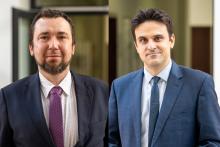
Extracting and casting metals: Two more successful tenure-track procedures at TUBAF
3.2.2025
In January, two professors were appointed to a regular professorship at the Faculty of Materials Science and Technology as part of TU Bergakademie Freiberg's WISNA tenure-track program. Professor Alexandros Charitos takes up the professorship for High Temperature Processes in Metallurgy; Professor Michal Szucki takes up the professorship for Casting Materials and Casting Processes. The two permanent appointments are the result of the positive evaluation of the tenure-track appointment procedures.
The research of Professor Alexandros Charitos (right in the photo) focuses on the combination of pyro-, hydro- and electrometallurgical processes with the aim of promoting the sustainable processing of waste streams, products at the end of their life cycle and the decarbonization of processes. For example, he deals with the recycling of valuable metals from electronic scrap and catalysts or the utilization of slags from metal production. More about Professor Alexandros Charitos.
Professor Michal Szucki (left in photo) is dedicated to innovative approaches in the field of foundry technology, with a particular focus on sustainable solutions. His research focuses on the recycling of cast composite materials, the use of secondary aluminium alloys and the optimization of foundry processes using digital systems such as sensors and simulations. He also researches environmentally friendly filter technologies and alternative, emission-neutral heat sources for metallurgical applications. More about Professor Michal Szucki.
Tenure-Track-Programme at TU Bergakademie Freiberg
The WISNA tenure-track program gives young researchers the opportunity to embark on a predictable academic career at an early stage. In doing so, the university is following the recommendation of the German Council of Science and Humanities for a cultural change in the promotion of young academics based on the Anglo-American tradition.
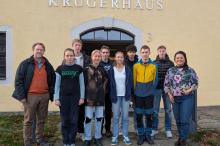
German Geosciences Olympiad in the 2nd round at the Krügerhaus
22.1.2025
On January 21, 2025, the national selection round of the Saxon finalists of the “Olympiad of Earth Sciences” took place in the Krügerhaus with eight young people from Dresden and Meerane. They had qualified in the competition organized by the “Dachverband Geowissenschaften”. In the first round, over 3,000 pupils from the 9th to 12th grade from almost all German states had registered. A total of 50 young people from all over Germany made it to the national final round, 11 of them from Saxony, eight of whom took part in the competition.
The tasks included geology, mineralogy, geophysics, palaeontology and astrophysics. Four winners from the second round will have the opportunity to take part in the International Earth Science Olympiad IESO, which will take place in Jining (China) in August 2025.
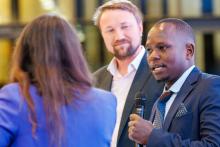
German-African innovation prize for additive manufacturing
22.1.2025
The German-African Innovation Award GAIIAt honours outstanding achievements by African researchers and is awarded every four years. Now, a cooperation project between TUBAF and the Jomo Kenyatta University of Agriculture and Technology Nairobi received the prize: Kenyan engineer Dr. Wamai Mwangi is awarded “for his excellent research on the use of novel bio-based materials in additive manufacturing in combination with a convincing proposal for a German-African cooperation project that further develops these research results into use-oriented solutions,” according to the Federal Ministry of Education and Research, which organizes the competition. Together with Professor Dr. Henning Zeidler from the Chair of Additive Manufacturing, Dr. Wamai Mwangi accepted the award in Berlin on 12 December 2024. Their joint project “RAMMforIU” aims to close the last gaps in research and promote spin-offs in Kenya in order to successfully transfer waste and residual materials to industrial use through 3D printing.
Dr. Friedrich Roth elected as new member of the Executive Committee of the European XFEL User Organization
22.1.2025
Dr. Friedrich Roth was introduced this week at the European XFEL (EuXFEL) User Meeting in Hamburg as a new member of the Executive Committee of the EuXFEL User Organization. The EuXFEL is a large-scale international research facility in Hamburg and Schenefeld, where a wide variety of experiments are currently being carried out on seven different instruments. These have a wide range of research applications in fields such as physics, chemistry, materials science, biology and nanotechnology. Dr. Roth will act as representative for the Soft X-Ray Port (SXP) user community for the next three years. The community focuses on the use of X-ray light from the free-electron laser for time-resolved X-ray photoelectron spectroscopy and deals with photo-induced dynamics at surfaces and interfaces of various material systems.
The purpose of the EuXFEL User Organization is to provide an organized framework for discussions between the users and the European XFEL Board, in particular to provide feedback to the Board in order to improve the conditions for users to perform experiments and to expand the user community.
Longstanding cooperation between TUBAF and XFEL
“My main goal will be to promote a transparent and inclusive environment in which user feedback is translated into concrete improvements,” says Friedrich Roth. He continues: “I am particularly keen to promote initiatives that drive forward-looking policies and improve the overall user experience. In this way, I want to ensure that our user community is properly supported and empowered to succeed and grow steadily over the coming years, eventually reaching a size comparable to other time-resolved technologies.”
The connection to large-scale research facilities such as EuXFEL is of particular importance for TUBAF. It opens up both educational and scientific opportunities. Based on a bilateral cooperation agreement, the “Structural Research with XFELs and Synchrotron Radiation” working group at the Institute of Experimental Physics has for several years provided TUBAF students with the unique opportunity to gain direct access to this globally unique large-scale facility during their training phase. This enables them to conduct cutting-edge research and write their master's or doctoral thesis. In addition to the direct involvement of students in current research, the program also includes the transfer of knowledge. This includes a series of lectures entitled “Materials research with X-ray free-electron lasers".
TUBAF awards four honorary and one university medal
15.1.2025
They have made a major contribution to the development of the university in their professional lives and are being honored with special awards from TU Bergakademie Freiberg: Emeritus Professor Michael Schlömann received the Medal of Honor on January 15, 2025; Emeritus Professor Klaus Spitzer was awarded the Golden Badge of Honor.
Microbiologist Prof. Dr. Michael Schlömann was appointed to the TU Bergakademie Freiberg 26 years ago. With his teaching and research, he made a significant contribution to firmly establishing biology as a discipline at the university. He was Dean and Vice-Rector of Education and in 2008 he took over the management of the university as Acting Rector on an interim basis.
Geophysicist Professor Klaus Spitzer's commitment to TUBAF can be traced back just as far. In addition to his commitment to teaching and students in applied geophysics, the Emeritus was also honored for his work as Dean and Vice Dean of the Faculty of Geosciences, Geotechnics and Mining.
The Rector of TU Bergakademie Freiberg also presented two silver badges of honor to Lars Pickhardt (Lederzentrum GmbH Rosdorf) and Annett Wolf (Geschwister-Scholl-Gymnasium Freiberg) at the Rectorate's New Year's reception.
Wie die anwesenden Geehrten die Zusammenarbeit mit der TUBAF erleben, erzählen sie im Video.
Next round in the ZeHS scholarship program
6.1.2025
For the second time, scholarships from the self-initiated program were ceremoniously presented at the Center for Efficient High Temperature Material Conversion on 20 December. A total of ten scholarship holders from four faculties received the interdisciplinary ZeHS scholarship. Successful students at an advanced Master's level from the approximately 40 working groups of ZeHS members were invited to apply. “I am very grateful to the scholarship providers from the Stifterverband that we are able to continue and further expand the scholarship program after last year's launch. We want to support the scholarship holders in engaging in an interdisciplinary exchange with each other, for which the funding is also available,” says Prof. Dirk C. Meyer, Academic Spokesperson. “The scholarship holders should once again be able to meet at suitable locations and at their home institutes and also invite guests who are speaking in front of a larger auditorium and require support for their travel expenses."

Cooperation with École des Mines de Saint-Étienne to be deepened
17.12.2024
From December 9 to 11, 2024, Marcus Dietrich, a staff member of the International Office at TU Bergakademie Freiberg, and Dr. Egle Dietzen, Education Officer for English-taught degree programs at the Faculty of Mechanical, Process, and Energy Engineering, traveled to France to visit the École des Mines in Saint-Étienne. The visit marks another successful step in expanding the university’s internationalization efforts.
The collaboration with the École des Mines arises from an initial contact made during a visit to ETSIME in Madrid in November 2024. In France, the discussions focused on establishing a new Erasmus agreement for student exchange as well as exploring the potential for joint research projects. The outcome of the visit is very promising: The partnership between TU Bergakademie Freiberg and the École des Mines is set to be strengthened and further developed. A return visit from the French team to Freiberg is planned for 2025.
Success for Ukrainian student
16.12.2024
From 2023, TU Bergakademie Freiberg will have access to around 300,000 euros from the DAAD programme "Future Ukraine". 11 particularly high-achieving scholarship holders are currently studying at TUBAF with the support of the programme. One of them is Anhelina Mospan, who defended her thesis in the Materials Science and Technology degree programme at the end of November. This makes her the first scholarship holder from the programme to successfully complete her studies.
At her home university in Dnipro, Ukraine, Anhelina Mospan was already enrolled on the double degree programme Material Science and Materials Technology (specialising in Steel Technology). She had to start her planned semester in Freiberg a year earlier due to the war: "I continued to attend courses in Dnipro online from Freiberg - as did my fellow students there, as there is currently no face-to-face teaching at my home university." Staff in Freiberg drew her attention to the DAAD scholarship because of her good performance: "Thanks to the financial support, I was able to concentrate exclusively on my studies. I was also able to complete additional German courses and make contacts with other scholarship holders from the DAAD programme."
The scholarships can be awarded until the end of July 2025 via the university's International Office. In addition to the scholarships, preparatory German courses, support for the scholarship holders from academic assistants and joint social and cultural activities are also funded.
New university cooperation in the Advanced Mineral Resource Development Master's programme
10.12.2024
Abylkas Saginov Karaganda Technical University (KSTU) has been the first Kazakh partner in the international master's programme ‘Advanced Mineral Resource Development’ since the beginning of December. Programme Director Professor Michael Tost, the Rector of TU Bergakademie Freiberg and KSTU Programme Director Professor Askar Imashev signed the agreement on 4 December 2024. The agreement with the University of Leoben, where the degree programme is based, TUBAF and KSTU enables students from Kazakhstan to come to Leoben and Freiberg to study for a Master's degree and obtain a triple degree. The English-language degree programme has been in existence since 2012.

Cooperation with Central Asia: Memorandum signed with the State Technical University in Bishkek
TUBAF sealed its cooperation with the Kyrgyz State Technical University at the end of November in Freiberg. The rectors of the two universities, Prof Klaus-Dieter Barbknecht and Dr Mirlan Chynybaev, signed a memorandum of understanding in which they initiated joint activities in teaching, studies and research.
The cooperation builds on previous visits and activities of both partners, in particular with the Centre for Skilled Labour Development at the Saxon Ministry of Economics and Labour or the Delegation for International Skilled Labour Security for Northern Saxony. In addition to training and further education at the local GlasCampus Torgau, the topic of raw material processing from old mines could be a starting point for cooperation.

Kooperation mit Raumtextilienshop.de und Lysel.de ermöglicht EDV-Seminare des Career Centers im Wintersemester 2024/25
Um die Aus- und Weiterbildung an der TU Bergakademie Freiberg zu unterstützen, sponsern die Unternehmen Raumtextilien.de und Lysel.de einen Großteil der Kosten für die Excel-Seminare des Freiberger Career Centers.
„Diese Unterstützung ermöglicht uns das Seminarprogramm für unsere Studierenden für das kommende Wintersemester zu sichern. Insbesondere für wissenschaftliche Arbeiten ist Excel ein sehr nützliches Werkzeug, dessen zahlreiche Funktionen in den Seminaren den Teilnehmern vermittelt werden", erklärt Dr. Kristina Wopat, Direktorin der Graduierten- und Forschungsakademie und des Career Centers. „Eine qualifizierte und fundierte Ausbildung der Arbeitskräfte von morgen liegt uns schon immer am Herzen. Zudem ist die Ressourcenuniversität in Freiberg mit Ihrer zukunftsorientierten Forschung ein wichtiger Impulsgeber für nachhaltige Innovationen und technologische Entwicklungen, die sowohl die regionale Wirtschaft stärken als auch globalen Herausforderungen begegnen."
Zur Kooperation
LYSEL erweitert kontinuierlich sein Produktsortiment in der Tradition der sächsischen Textilindustrie. Das Unternehmen bietet maßgefertigte Sicht- und Sonnenschutzlösungen wie Plissees, Rollos und Gardinen sowie Heimtextilien und Akustikbilder. Für den Outdoor-Bereich bietet LYSEL u.a. maßgeschneiderte Planen, Abdeckhauben, Segeltücher, Sonnensegel, Kederschienen und Zubehör an.
Raumtextilienshop.de, als LYSEL-Fachhändler, bietet maßgefertigte Sicht- und Sonnenschutzlösungen wie Plissees, Rollos, Lamellenvorhänge und Gardinen sowie Heimtextilien an. Ein übersichtliches Menü und praktische Filter führen schnell zum Wunschprodukt. Kostenlose Stoffmuster und 3D-Konfiguratoren ermöglichen individuelle Maßanfertigungen und interaktive Kauferlebnisse. Mess- und Montageanleitungen sind digital verfügbar.
TUBAF-Projekt "Nomadenkinder" bei Botschafter vorgestellt
Meldung vom 4.11.2024
Anlässlich des 50-jährigen Jubiläums diplomatischer Beziehungen zwischen der Mongolei und der Bundesrepublik Deutschland lud der mongolische Botschafter, S.E. Mandakhbileg Birvaa, ausgewählte Vertreter der Technischen Universität Bergakademie Freiberg nach Görlitz ein. Mit großer Freude folgten die Mitarbeitenden Kathrin Häußler und Andreas Hiekel dieser persönlichen Einladung am vergangenen Reformationstag. Ein besonderer Schwerpunkt der Beziehungen liegt auf Bildungsinitiativen wie dem Erasmus+-Projekt „Nomadenkinder“. Dieses Projekt eröffnet Kindern in der Mongolei bessere Bildungs- und Entwicklungschancen und fördert gleichzeitig den interkulturellen Austausch. Auch die kommende Junioruni, die am 30. November mit einem Schwerpunkt auf der Mongolei stattfinden wird, schafft wertvolle Begegnungen und Einblicke für junge Menschen in Sachsen, die mehr über die Kultur, Wissenschaft und Geschichte der Mongolei, insbesondere dem Leben und dem Alltag der Kinder, erfahren möchten.
Durch Projekte wie „Nomadenkinder“ und die Junioruni, die durch das Engagement an der TU Bergakademie Freiberg verwirklicht werden, entsteht eine Brücke zwischen den beiden Ländern, die weit über die akademische Kooperation hinausgeht. Die Bemühungen der TUBAF, diese Partnerschaft aktiv zu gestalten, stärken das Ansehen des Freistaates als internationalen Akteur im Bildungs- und Kultursektor und tragen zur weiteren Festigung der deutsch-mongolischen Freundschaft bei.
TUBAF-Forschungsprojekt zur frühen Erde: Modell der vertikalen Tektonik bestätigt
Meldung vom 29.10.2024
Entstanden die frühesten Gesteine auf der Erde vor zirka 4,1‒3,2 Milliarden Jahren durch horizontale Bewegungen der Erdplatten (Plattentektonik) oder durch vertikale Umwälzungen in der Kruste? Diese Frage beschäftigt die Geowissenschaften seit rund sechzig Jahren. Nun hat eine Forschungsgruppe mit Beteiligung der TUBAF im australischen Outback Daten gesammelt, die die Theorie der vertikalen Tektonik stützen.
„Modelle, die die vertikale Tektonik erklären, stützen sich auf Gesteinsstrukturen im East Pilbara Terrane in Nordwest Australien. Denn die rund 3,6–3,2 Milliarden Jahre alten Strukturen werden von Vertreterinnen und Vertretern dieser Theorie als dichtegetriebene partielle Umwälzung interpretiert. Plattentektonische Modelle schlagen hingegen vor, dass sich das Terrane durch mehrere horizontale Kompressions- und Dehnungsereignisse entlang einer konvergenten Plattengrenze gebildet hat“, erklärt Professor Lothar Ratschbacher.
Nach sechswöchiger Feldarbeit im abgelegenen australischen Outback bestätigt die Gruppe um Ratschbacher nun das Modell der vertikalen Tektonik: „Die Strukturen deuten auf ein initiales Gravitationsgleiten der Gesteine weg von aufsteigenden Kuppeln, was zu vertikalen Gesteinsgefügen und schließlich zu horizontalen Verkürzungen zwischen den aufsteigenden Kuppeln führte.“
Bis 2026 möchte die Forschungsgruppe die strukturelle Entwicklung mit radiometrischen Methoden genau zeitlich festlegen. Das Kooperationsprojekt der TUBAF, der FU Berlin und der Universität Hong Kong, das durch die Deutsche Forschungsgemeinschaft (DFG) an die TUBAF gefördert wird, untersucht die Frühe-Erde-Modelle strukturell, das heißt, es erfasst Strukturen und bewertet ihr Potenzial zur Unterscheidung zwischen den kompetitiven Modellen.
Es gibt zwei Denkgruppen:
- Plattentektonik hat die Erde während und seit der ältesten Ära der Erdgeschichte geformt.
- Vertikaler Krustentransport, induziert durch Dichteunterschiede in der Kruste, sogenannte "vertikale Tektonik" dominierte die frühe Erde.
Bisher sind die beiden verschiedenen Forschungsansätze nicht zu einem Konsens gekommen.
Skilled workers for the glass industry - TU Bergakademie Freiberg supports cooperation with Kyrgyzstan
25.10.2024
A delegation of representatives from the administration and economy of northern Saxony travelled to Kyrgyzstan in September. Dr Khaled Al Hamdan from the Institute of Glass and Glass Technology was also there as a representative of TUBAF. The aim of the trip was to recruit new skilled workers for the glass industry in northern Saxony. As a scientific partner, TUBAF has been supporting the training and further education of skilled workers here for some time - with the GlasCampus Torgau and, since 2022, with the GlasLAB, which was established there as a research facility.
The delegation also visited the University of Karakol. Here, Dr Al Hamdan presented TU Bergakademie Freiberg and the Institute of Glass and Glass Technology in particular. An important outcome of the trip is the planned return visit by the rectors of the University of Karakol and the Kyrgyz State Technical University of Bishkek to Freiberg on 27 November 2024 to develop further opportunities for cooperation.
Another starting point for cooperation could be the processing of raw materials from the remains of old uranium mining to extract rare earths. This would open up opportunities for a whole series of future collaborations with many TUBAF institutes.
Donation for university archive: Portrait of Sigismund Herder handed over to TUBAF
21.10.2024
Last week, Werner Sieber, former managing director of Augustusburg Castle and Scharfenstein Castle as well as Lichtenwalde Castle, handed over six valuable etchings to the TU Bergakademie Freiberg on behalf of the descendant of the chief mining administrator Sigismund August Wolfgang, Freiherr von Herder. The collection includes the impressive portrait of the chief mining captain and pictures of the Herder family's ancestral castle Rauenstein.
The handover took place during a festive ceremony in the office of the Rector of the TU Bergakademie, which was attended by the Rector, Professor Klaus-Dieter Barbknecht, Professor Georg Unland, Rector of the TU Bergakademie Freiberg from 2000 to 2008 and former Saxon Minister of Finance, and the Vice-Rector for Communication and Sustainability at the TU Bergakademie Freiberg, Professor Andreas Horsch. Baron v. Herder had given these etchings for the local history and identity of the TU Bergakademie Freiberg to Werner Sieber with the request that they be donated to the TU Bergakademie Freiberg. Werner Sieber commented: ‘It is an honour for me to hand over these pictures to the TU Bergakademie Freiberg, which will make them accessible to science and the public. They are a valuable part of our shared past’.
Über Freiherr Sigismund August Wolfgang von Herder
Freiherr Sigismund August Wolfgang von Herder war der Sohn des bekannten Dichters Johann Gottfried Herder. Seine Paten waren unter anderem Johann Wolfgang von Goethe, Johann Georg Hamann und Matthias Claudius. Nach seiner Studienzeit an den Universitäten Jena, Göttingen und an der Bergakademie Freiberger erhielt er 1802 eine Anstellung im kursächsischen Bergdienst, bei dem er in den Bergämtern Marienberg, Geyer, Ehrenfriedersdorf und Schneeberg tätig war. Seit 1813 war er in Freiberg tätig und hier erarbeitete er Pläne zur Wiederaufnahme des zerstörten Bergbaus. 1826 wurde er zum Oberberghauptmann, dem höchsten Verwaltungsbeamten im Bergstaat Sachsen ernannt, und fungierte als Kurator der Bergakademie. U.a. wurde durch seine Anregungen die Ausbildung auf der Bergakademie Freiberg verbessert.
Er hatte eine besondere Leidenschaft für Berguniformen und Bergaufzüge. Seine Bergbarte, kann man noch heute im Büro des Rektors der TU Bergakademie Freiberg bewundern. Er wurde nach seinem Tode in der Halde der Grube Heilige 3 Könige in Freiberg mit Blick auf die heutige Bergbaulandschaft beigesetzt.
New partner university for Advanced Mineral Resource Development Master's programme
21.10.2024
On 2 October 2024, another partner university joined the English-language TUBAF Master's programme ‘Advanced Mineral Resource Development’. The new partner is Navoi State Mining University in Uzbekistan. After the start of the ‘multiple’ and ‘joint degree’ programme between Montanuniversität Leoben and TU Bergakademie Freiberg in 2012, it is now the eleventh partner. As a rule, the first two semesters of the programme take place in Leoben and Freiberg and the third and the semester for the Master's thesis at the respective partner university, usually in the students' countries of origin.
‘With Navoi State Mining University, Uzbekistan is another important mining country represented in the world's largest raw materials training network,’ sums up Carsten Drebenstedt, Dean of Studies for the programme at TUBAF, who signed the contract on behalf of the Rector. ‘With the inclusion in the Master's programme, the cooperation that has existed for 20 years will take on a new quality and dynamic’. Rector Bakhtiyor Mardonov sees the new cooperation as a deepening of the good German-Uzbek cooperation and a further step towards the internationalisation of teaching and research, from which students and teaching staff on both sides will benefit equally.

Recycling and upcycling of industrial waste in the international workshop
17.10.2024
The Research Training Group GRK 2802 and the Department for Industrial Engineering have organised a joint international workshop in Padova. The International Workshop was hosted by the renowned ceramics scientist, Prof Paolo Colombo from the University of Padova. The international workshop focussed on the recycling and upcycling of industrial waste (MgO-C, geopolymers) and the application of new technologies (additive manufacturing, hybrid firing technologies).
From 9-11 October 2024, an international workshop was held at the University of Padova between the Research Training Group GRK 2802, established at TU Bergakademie Freiberg, and the Department for Industrial Engineering at the University of Padova.
Bericht vom Workshop
The first day of the international workshop was organised by Dr Enrico Storti (former scientific coordinator of the Research Training Group GRK 2802). Dr Enrico Storti completed his doctorate at TU Bergakademie Freiberg in 2018 and received the DFG Walter Benjamin Fellowship for PostDocs in 2023. He currently works at EMPA in Dübendorf (Switzerland) and also teaches at the University of Padova (Italy). During guided tours, the participants of the international workshop were able to visit the historical seat of the University of Padova, one of the oldest universities in Europe (founded in 1222). One of the most famous professors at the University of Padova was the Italian polymath Galileo Galilei, who gave lectures in mathematics, physics and astronomy at the University of Padova from 1592 to 1610. The historic lectern that Galileo used for his lectures can still be admired today in the anteroom of the Aula Magna. The first day of the workshop was rounded off with a visit to the Capella degli Scrovegni e Musei Civici Eremitani di Padova, part of the ENSCO World Heritage Site ‘The frescoed cycles of the XIV century of Padua’, famous for the fresco cycle by Giotto the Bondone and sculptures by Giovanni Pisano.
The scientific part of the International Workshop was opened on 10 October 2024 by the host, Prof. Paolo Colombo. Professor Colombo is Full Professor at the University of Padova, Adjunct Professor of Materials Science and Engineering at Pennsylvania State University (USA), Honorary Professor at University College London (UK), Fellow of the European Ceramic Society (ECERS), Fellow of the American Ceramic Society (ACERS) and member of several academies (World Academy of Ceramics, European Academy of Sciences, Italian Academy of Engineering and Technology). Prof Aneziris then briefly presented the latest research topics at the Institute of Ceramics, Refractories and Composites. The introductory lectures by Prof. Colombo and Prof. Aneziris were followed by scientific presentations by post-docs from the University of Padova (Dr Filippo Gobbin and Dr Marco D'Agostini) and doctoral students from the Research Training Group GRK 2802 (Alexander Schramm and Serhii Yaroshevskyi). During the international workshop, the researchers from both universities exchanged their ideas and experiences and developed new approaches for their further scientific work in fruitful discussions. Following the presentations, the participants of the International Workshop had the unique opportunity to take a look behind the scenes of current research at the University of Padova.
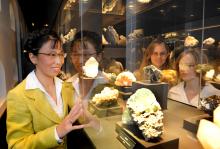
Terra mineralia listed as a lighthouse for tourism in Saxony
5.10.2024
The mineral collection of the TU Bergakademie Freiberg was recently listed in an international tourism database as particularly worth seeing. This opens up another way for terra mineralia to present and promote its collections internationally.
The entry was made in the so-called ‘DZT Knowledge Graph’, a digital database of the German National Tourist Board (DZT), which structures and links information about German destinations in order to help tourists and tour operators in the international market to find relevant and personalised information. The aim of the database is to provide the most relevant objects per federal state (sights, attractions, tours and events) for Germany in the Knowledge Graph. This is particularly important for international data users and the corresponding marketing by the GNTB's agencies abroad.
TMGS (Tourismus Marketing Gesellschaft Sachsen) provides the Knowledge Graph with information from the Free State of Saxony. The TMGS has nominated and selected terra mineralia and the Krügerhaus for the top list for Saxony.
Intelligent Simulation & Control: Ulrich Römer appointed to Professorship of Engineering Mechanics
8.10.2024
The engineer succeeds Professor Alfons Ams at TUBAF. During and after his doctorate at the Institute of Technical Mechanics - Dynamics/Mechatronics at KIT, Prof. Dr.-Ing. Ulrich Römer researched robotics, in particular the energy efficiency and optimisation of robots. He then worked as an academic counsellor at the same institute. Professor Ulrich Römer's other areas of research include current methods for data-based models of dynamic systems and model reduction of high-dimensional and accurate FEM models for efficient simulation and control. The abbreviation FEM stands for the Finite Element Method.
At TUBAF, he will continue his previous scientific specialisations and cooperate with new partners. In teaching, Professor Ulrich Römer wants to cover everything from the classical fundamentals of mechanics to current research topics: ‘Particularly in the basic courses, it is still true that mechanics and an understanding of physics can only be learnt through extensive practice. I would like to provide a wide range of opportunities for students in this area.’
Calculating models for the subsurface: New Professor for Applied Geophysics
2.10.2024
Prof Dr Thomas Günther was appointed to the professorship for Applied Geophysics/Electromagnetics and Potential Methods at TU Bergakademie Freiberg on 1 October. The Freiberg University alumni is moving from the Leibniz Institute for Applied Geophysics in Hanover to TUBAF, succeeding Prof Klaus Spitzer. In Hanover, he focussed on geoelectric and electromagnetic methods in the research field for the exploration of groundwater systems and mineral resources from the ground and from the air.
Among other things, the geophysicist has developed concepts and methods for modelling and inversion, i.e. for computing processes that generate a subsurface model from geophysical data. This can be used to visualise groundwater salinisation or raw material deposits, for example. At TU Bergakademie Freiberg, the new professor wants to develop technologies for the electromagnetic exploration of raw materials from the air and for the efficient evaluation of large-scale data sets. His theoretical and practical experience complement each other. ‘For me, the key to understanding in teaching is ‘hands-on’, interactive play.’
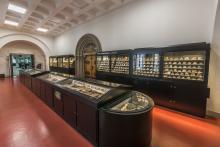
‘One of the largest and most beautiful geological university collections in the world’
2.10.2024
Great honour for Mineralogical Collections of TU Bergakademie Freiberg: At the 37th International Geological Congress of the International Union of Geological Sciences (IUGS), the Mineralogical Collection of TU Bergakademie Freiberg was selected as one of the first 11 IUGS Geo-Collections in the world.
An IUGS Geo-Collection is a museum or university collection of global importance due to its particularly high scientific, historical or educational relevance for the geosciences. The Freiberg collections were selected because they are among the oldest, largest and most beautiful collections of their kind in the world. ‘The most important historical foundation of the collections are the originals by Abraham Gottlob Werner. However, the many first descriptions and originals by Breithaupt, Weisbach, Cotta, Stelzner, Kolbeck and Schumacher are also of great importance. A large number of stored samples from student theses, dissertations, research projects and excursions are available for scientific enquiries,’ says curator Andreas Massanek. ‘However, the collections are not only used to train students or as a source for scientific research. They are open to the public and are used by school classes as part of the curriculum, but also in tourism.’
The Freiberg collection is the only mineralogical collection to make it into the top 11 IUGS geo-collections. The other ten collections are primarily concerned with palaeontology or meteorites. The International Commission on Geoheritage exists under the umbrella of the IUGS. Its task is to raise public awareness of the world's ‘geoheritage’. Three sub-commissions select the most important geo-locations, rocks and collections. For example, the Scheibenberg in the Ore Mountains became such a geolocation, as it was here that the plutonists and neptunists argued about the origin of basalt, and the Rochlitz porphyry tuff, which is widely used as a decorative rock, became the first IUGS geoheritage rock.

Sustainable mining with microorganisms: Sabrina Hedrich appointed to the Professorship of Microbiology and Biohydrometallurgy
1.10.2024
Sabrina Hedrich took up the professorship for Microbiology and Biohydrometallurgy on 1 October. She is the second young scientist to be appointed to a regular professorship in the WISNA Tenure Track Programme at TU Bergakademie Freiberg. The bioscientist has been researching as a junior professor at TUBAF since 2020. Following a positive evaluation of her work, she has now been offered a permanent position.
Professor Sabrina Hedrich's field of research is biohydrometallurgy, in which raw materials are extracted with the help of microorganisms. She is investigating how bacteria can be used to extract metals from ores, industrial residues and waters affected by mining. In particular, it researches bioleaching processes for primary and secondary raw materials as well as the biological treatment of mining wastewater. Other scientific focuses are microbial communities in extreme locations such as acidic mining waters and volcanic areas as well as the characterisation of novel microorganisms.
Professor Sabrina Hedrich has already been able to acquire numerous research projects with renowned international partners. For example, she coordinates the XTRACT consortium, which is developing new processes for a sustainable and emission-free mining industry of the future. In the regional MindMontan project, she is developing innovative technologies in the Recomine alliance to reduce the impact of mining on the environment.
Awards for materials scientists of TUBAF
24.9.2024
Several awards from the German Society for Materials Science (DGM) will go to TUBAF in 2024.
Dr Anja Weidner is honoured as a DGM pioneer. ‘This is a recognition of her tireless activities to link fundamental scientific methods of in situ characterisation with the application of these methods to clarify practical issues in materials technology. In doing so, she makes a significant contribution to the exchange of knowledge between universities, research institutions and companies in Germany and abroad,’ said Professor Martina Zimmermann from TU Dresden in her laudatory speech for the award winner. In an interview with the professional society, the materials scientist reveals what the award means to her.
The DGM Young Scientist Award goes to Dr Ruben Wagner, who completed his doctorate in the Collaborative Research Centre SFB920 "Metallschmelzefiltration - Ein Beitrag zu Zero-Defect Materials at TU Bergakademie Freiberg between 2019 and 2023. He receives the prize for his outstanding results on microstructural research into non-metallic inclusions in a steel after melt filtration, their formation and their effect on the mechanical properties. He explains here how he mastered the leap from science to practice.
Professor Thomas Niendorf from Kassel, a former employee of the Institute of Materials Engineering, where he worked as the head of an Emmy Noether junior research group in 2014 and 2015, will also receive the DGM Prize. He is being honoured for his scientific achievements in the field of additive manufacturing: ‘In his academic career, Thomas Niendorf has explored an impressive range of scientific topics. In the field of additive manufacturing, he has gained worldwide recognition along the entire chain from manufacturing and structure to property characterisation, as is impressively demonstrated by highly cited publications,’ said Professor Hort Biermann in his laudatory speech.
All prizes were awarded on 23 September at the annual general meeting of the German Society for Materials Science (DGM).
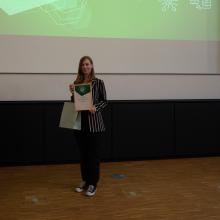
SaxFDM research data management
18.9.2024
How can research software be used optimally? How can scientists access research data with as few barriers as possible? How can current research data be used in teaching at universities? These questions were the focus of this year's SaxFDM conference, which took place on 17 September 2024 at the University Library of TU Bergakademie Freiberg. ‘We had around 100 participants yesterday,’ explains Dr Dana Kuhnert from the University Library of TU Bergakademie Freiberg, ’that's really strong.’
TUBAF Vice-Rector for Research, International Affairs and Transfer Prof Tobias Fieback welcomed the participants to Freiberg. The conference began with four keynote speeches and ended with a panel discussion on the topic of ‘Opening up data sets? The challenges and opportunities of re-utilising research data’. The SaxFDM Open Data Awards were also presented for outstanding projects in the field of research data management. Steffen Kailitz (submitter) and Nicole Husemann (in the photo) from the Hannah Arendt Institute for Totalitarianism Research at TU Dresden were honoured with the first prize for their submission: Varieties of Political Regimes.
SaxFDM organises annual conferences. These take place in the major libraries of Saxony's universities (2019 SLUB Dresden, 2021 virtual, 2022 Leipzig University Library: Bibliotheca Albertina, 2023 Chemnitz University Library TU).
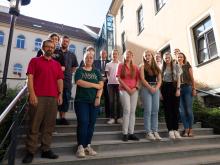
TUBAF welcomes new trainees
13.9.2024
Seven motivated young talents started their careers at TUBAF on 1 September 2024. For the first time, one of them is a trainee surveying technician. He and his trainer, Dr Thomas Martienßen, are very much looking forward to the upcoming three years of training together at the Institute of Mine Surveying and Geodesy. With the new intake, the university is now training a total of 18 apprentices.
The official welcome of the trainees and their trainers in the auditorium of the main building by department head Carolin Herrmann and her staff marked the start of the event. The event then continued with a tour of the main university building and the new university library, followed by lunch together in the cafeteria. The trainees got to know important contacts and trainees from other year groups. Antje Müller, herself a trainee media and information services specialist, led the tour of the new university library building. The young people learnt lots of interesting facts about the university.
Gas for Future - from natural to green gas
9.9.2024
Starting today, 20 pupils are conducting research at the MINT-EC camp ‘Future Energy - Gas for Future - from natural gas to green gas’. Until 12 September, the participants from schools in the national excellence school network MINT-EC will be learning all about gas and renewable energies as energy sources together at the TU Bergakademie Freiberg. On the first day, the young people listen to an introductory lecture on the basics of energy production to give them an overview. During the camp, they learn about technologies for converting electricity into gas as a storable energy source. In experiments, the young people explore how much electricity can actually be generated from the wind and how hydrogen or methane is produced from electrical energy. The pupils then see the theoretical knowledge applied when they visit biogas and hydrogen production plants in Raitzen. In discussions with experts, the pupils reflect on the advantages and disadvantages of the technologies under consideration for the environment and society.
Institute of Materials Engineering celebrates 50 years
6.9.2024
The Institute of Materials Engineering at TU Bergakademie Freiberg has been in existence since 1974 - and with it the field of study Materials Engineering (today as a specialisation in the Materials Science and Technology degree programme). Together with the founder of the institute, Emeritus Professor Heinz-Joachim Spies, the team led by Professors Horst Biermann and Lutz Krüger celebrated the 50th anniversary. In addition to former employees, many graduates also found their way to their alma mater Fribergensis.
617 degrees, 110 doctorates and 4 habilitations have been supervised at the institute over the past 50 years. It currently employs over 30 members of staff who are particularly involved in the research fields of investigating mechanical properties, for example under multi-axial stress conditions or high-speed influences, as well as methods of surface layer technology and electron beam technologies, such as additive manufacturing, which are always accompanied by comprehensive microstructural investigations.
25 years after graduating, TUBAF will award the ‘Silver Diploma’ to 15 alumni of the Materials Engineering programme and 8 doctoral graduates at the anniversary celebration. An insight into the history of the institute and several specialist lectures on the institute's research areas rounded off the programme.
At the same time, the festive event was also an honorary colloquium on the occasion of Prof. Spies' 90th birthday in June of this year. Many former companions, such as a board member of the Arbeitsgemeinschaft Wärmebehandlung und Werkstofftechnik e. V., took the opportunity to express their thanks and appreciation to Prof Spies.
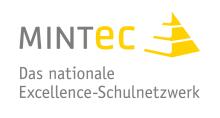
International MINT-EC-Camp „Zukunft Werkstoffe“
28.8.2024
This week, the four-day international MINT-EC camp ‘Future Materials’ is taking place at the Technical University Bergakademie Freiberg. From 27 to 30 August, 21 students from schools in the national excellence school network MINT-EC, including 10 from the Greek MINT-EC partner school Ellinogermaniki Agogi in Pallini, Attica, will be given an overview of issues relating to the sustainable use of finite resources.
At the camp, the young people will explore how innovative and sustainable methods can be implemented economically. They will be familiarised with the university's research areas and study programmes. A special highlight is an escape adventure in which they playfully familiarise themselves with the work of materials scientists. In the CAVE, the projection room for interactive virtual reality experiences, they examine complex technical systems and 3D models that are used for geosciences. They will also visit the terra mineralia mineral exhibition, the interactive raw materials exhibition ‘The Salt of Life’ and take a trip to the UNESCO World Heritage region of the Ore Mountains.
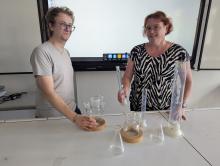
How TUBAF supports schools
12.8.2024
On 12 August, Konrad Burkmann (PhD student at the Institute of Physical Chemistry at TUBAF) handed over a donation of various glassware to the vocational school centre e.o.plauen (Plauen, Vogtland) on behalf of the Faculty of Chemistry, Physics and Biosciences. According to subject teacher Kathrin Brückmann, 150 beakers, 500 test tubes, 100 Erlenmyer flasks and countless other items will ensure that the school can continue to provide an experimentally based education in the natural sciences in the future: ‘It is particularly important to me that experimentation is not neglected in chemistry lessons in order to promote fun in the natural sciences. Unfortunately, things break from time to time and buying new equipment is usually expensive. Thanks to the donation, we will be able to ensure a sound education in the natural sciences at the ‘eo’ in the future.’
TUBAF has been successfully cooperating with e.o.plauen for many years in the context of events for pupils: ‘There has been close contact between TUBAF and “eo” for a long time. Many alumni study in Freiberg and it's always nice to see one or two of them again during our visits to the university as part of project days or at student recruitment events at our school,’ says Brückmann.
A positive side effect of the donation is entirely in line with the sustainability endeavours of Freiberg's University of Resources: the continued use of glass stocks that are no longer required, which would otherwise have to be disposed of due to renovation work at the university.
New Professor of Economic History and Industrial Archaeology
1.8.2024
Professor Dr Eva-Maria Roelevink is moving from the University of Mainz to TU Bergakademie Freiberg on 1 August 2024. In Mainz, the habilitated historian had been a junior professor of economic history since 2017; before and after completing her doctorate, she was an academic counsellor at Ruhr University Bochum. Her teaching and research interests lie in the history of the coal and steel industry(s), the transformation of glocal resource economies and the management of resource conflicts, the history of materials and corporate history policy. Economic history is a highly interdisciplinary field of teaching and research. Co-operation and collaboration with other subject areas are essential. Perspectives on materiality and resource flows are linked with economic activity and economic change. Over the next few years, the professorship will impart expertise in economic history in teaching and take up co-operative research activities in the fields of institutional change, glocal mining industries and economic activity.
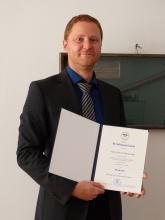
Heisenberg-Professorship "Physik der Quantenmaterialien" prolonged
29.7.2024
Following a positive evaluation, Prof. Dr Daniel Hiller was appointed to the Professorship of Physics of Quantum Materials at TU Bergakademie Freiberg on 29 July 2024. The Heisenberg Programme of the German Research Foundation (DFG) has supported the establishment of the professorship since 2021. Now, in the second funding phase of the Heisenberg Programme, the professorship will be extended by two years at TU Bergakademie Freiberg and the new research field of physics of quantum materials in the field of silicon and germanium semiconductors will be continued. The professorship deals with new methods of doping nanostructures and investigates special interface defects for applications in nanoelectronics and quantum electronics. At TU Bergakademie Freiberg, the physicist uses novel physical and quantum chemical effects to control the conductivity of nanowire transistors and thus enable even smaller, more powerful and, above all, more energy-efficient components. "The miniaturisation of transistors on chips is reaching more and more fundamental limits, so new research approaches are needed for further development. I am delighted to be able to continue this exciting research work at the Institute of Applied Physics in collaboration with the Central Cleanroom Laboratory at TU Bergakademie Freiberg," says Professor Daniel Hiller.
Prior to his appointment at TU Bergakademie Freiberg, the habilitated physicist worked in various research and teaching positions, including as an academic advisor at the Institute of Microsystems Engineering (IMTEK) at the Albert Ludwig University of Freiburg, as well as a Feodor Lynen Fellow of the Alexander von Humboldt Foundation at the Australian National University (ANU) and as a Humboldt Return Fellow at TU Dresden.
Humboldt ist zurück in Freiberg – Silberweg-Skulptur am Schlossplatzquartier enthüllt
Meldung vom 28. Juni 2024
Er war lange unterwegs, Freibergs prominentester Absolvent Alexander von Humboldt. Nach einem in Rekordzeit von 9 Monaten absolvierten Bergbaustudium zog es den Universalwissenschaftler 1792 in die Welt, insbesondere nach Südamerika. Jetzt ist er zurück an seinem Studienort: Am 28. Juni 2024 wurde vor dem Hörsaalgebäude am Freiberger Schlossplatzquartier eine Skulptur des Forschungsreisenden enthüllt. Anwesend waren u.a. der Kanzler der TUBAF Jens Then, der Baubürgermeister der Stadt Martin Seltmann und der Künstler Robert Frenzel.
Die Skulptur gehört zum Silberweg der Stadt Freiberg. Anhand dieser Route können Interessierte in die Stadtgeschichte eintauchen. Gesäumt wird der Weg von überlebensgroßen Figuren, die über eine App Informationen zum Ort preisgeben. Die Humboldt-Skulptur ist die mittlerweile neunte in der Reihe, zwei weitere werden noch folgen. Nach Aussage der Stadt ist der Silberwegskulpturenpark gemessen an der Zahl der beteiligten Künstlerinnen und Künstler derzeit das größte Kunstprojekt in Mitteldeutschland. TUBAF-Kanzler Jens Then betonte, dass die Humboldt-Skulptur sichtbares Beispiel für die enge Zusammenarbeit von Universität und Stadt sei, die sich auch an anderen gemeinsamen Projekten zeige wie unter anderem der alle zwei Jahre stattfindenden Nacht der Wissenschaft und Wirtschaft und der Initiative Freiberg.Science.City.
Mit Carlowitz und Humboldt Freiberg entdecken – TUBAF ist bei Kunstprojekt dabei
Meldung vom 20.6.2024
Wer Freiberg kennenlernen möchte, kann dies auf dem Silberweg tun – begleitet von Persönlichkeiten der Stadtgeschichte, die als Skulpturen den Rundgang säumen. Auf dem Silberweg sind die ersten der Figuren aufgestellt. Am 20. Juni 2024 fand die Einweihung von vier weiteren statt. Darunter auch die Figur des Erfinders der Nachhaltigkeit, Hans Carl von Carlowitz im Freiberger Albertpark. Und schon am 28. Juni 2024 wird im Schlossplatzquartier der TUBAF eine Skulptur, die Alexander von Humboldt darstellt, feierlich eingeweiht. Die TUBAF trägt mit der Skulptur Humboldts als einem der bedeutendsten ihrer Absolventen sowie mit Hans Carl Von Carlowitz, dem „Erfinder“ der Nachhaltigkeit zu diesem Projekt bei.
An die Skulpturen ist eine digitale Plattform (via App) gekoppelt, die anschauliche, unterhaltsame sowie informative Bildungsangebote bereitstellt. Hier erfahren Neugierige etwas zum Leben und dem Wirken der dargestellten Persönlichkeiten in Freiberg. Kinder werden spielerisch zum Forschen und zu einem naturwissenschaftlichen Verständnis der Welt animiert. Die Ausgestaltung und Produktion der zusätzlichen digitalen Lehr – und Wissensangebote der TUBAF-Figuren erfolgte federführend durch Kathrin Häußler, Andreas Hiekel, Patrick Morgenstern sowie Science Entertainer und Freund der TUBAF, Joachim Hecker.
Neben dem Gelehrtenweg und der Entdeckertour ist die Stadt Freiberg mit dem Silberstadtweg nun um eine Attraktion reicher. Weitere Informationen

Aktionstag „genial sozial“: 10 Schülerinnen und Schüler in Büros und Technika der TUBAF
Meldung vom 18.6.2024
Die TU Bergakademie Freiberg nimmt 2024 zum ersten Mal am Aktionstag „genial sozial“ teil. Begleitet von Mitarbeiterinnen und Mitarbeitern der Universität tauschen die Jugendlichen für einen Tag die Schulbank gegen einen Job an der TUBAF ein: So unterstützen zwei Teilnehmerinnen beim Verein für Weiterbildung an der TU Bergakademie Freiberg, ACATRAIN e.V.. Weitere Einsatzorte sind im Universitätsarchiv, am Schreibtisch und im Labor. Zum Beispiel helfen die Schülerinnen und Schüler bei der Vorbereitung des traditionellen Haldenfestes, bereiten Laborpraktika vor oder inventarisieren Verbrauchsmaterial.
Der erarbeitete Lohn wird von der TUBAF direkt auf das Konto von „genial sozial“ gespendet; die Sächsische Jugendstiftung unterstützt damit soziale Projekte vor Ort in Sachsen und weltweit. „Indem wir Teil dieser Aktion werden, ermöglichen wir einerseits den jungen Menschen, einen Einblick in unseren Dienstbetrieb und unterstützen andererseits soziale Projekte“, sagen die Ausbildungsverantwortlichen des Dezernates für Personalangelegenheiten.
Der Tag steht unter der Schirmherrschaft des sächsischen Ministerpräsidenten Michael Kretschmer und ist initiiert von der Sächsischen Jugendstiftung. Ergänzende Informationen zum Aktionstag
Tackling legal and economic issues together? Conference on Mergers & Acquisitions at TUBAF
17.6.2024
On 17 June, the conference "Mergers & Acquisitions (M&A) in the field of tension between law and economics: Current findings from research and practice" took place at the TU Bergakademie Freiberg with more than 80 participants. As an interdisciplinary problem in the field of tension between legal and economic issues, M&A transactions require a broader view not only in practice but also in science. Against this background, the conference is aimed equally at members of law and economics. "As Vice-Rector for Sustainability and Communication, I am particularly pleased that the topic of sustainability / ESG will be discussed in the M&A context by several contributors and from both a legal and an economic perspective," says Professor Andreas Horsch, who is organising the conference together with Professor Jutta Stumpf-Wollersheim and in cooperation with M&A Alumni Deutschland e.V.
JuniorUni with Science-Entertainer Joachim Hecker
10.6.2024
On Saturday, 8 June 2024, a new edition of the JuniorUni took place - in the form of two exciting lectures for children. They came with parents and grandparents to listen to the well-known book author and science entertainer Joachim Hecker. In the packed lecture theatre in TUBAF's Schlossplatzquartier, there were exciting, spectacular experiments from the field of chemistry, insights into amazing acoustic phenomena and lots of questions: Why don't balloons like oranges? How do you blow up a balloon with baking powder? How is elephant toothpaste made? What is a ‘chemical reaction’? How can the oldest substance in the world be made with vinegar and a pencil sharpener? And why does it explode? How do nappies work, why do astronauts wear them and why are they used in Hollywood to make winter films in summer?
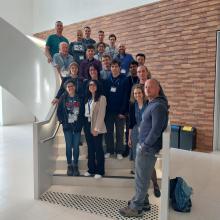
Workshop Aysmptotics at TUBAF
10.6.2024
The Asymptotics2024 workshop will take place at TU Bergakademie Freiberg from 10 to 13 June. Mathematical descriptions of everyday phenomena are often too complicated to explicitly calculate their solutions. Therefore, mathematics tries to describe these solutions in other ways. "For example, if you can prove that a system is constantly losing energy, this allows conclusions to be drawn about the solutions to the corresponding equations. If you can describe materials in such a way that they vary greatly in microscopic areas but are mixed well enough, this opens up the potential to simplify the equations themselves in such a way that their solutions can in turn be easily calculated using a computer," says Professor Marcus Waurick, whose working group at the Chair of Partial Differential Equations is organising the workshop.
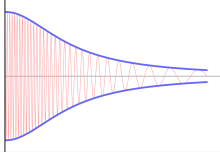
The workshop, which will be attended by leading experts from nine countries, will focus on the mathematical treatment of these complex topics. "While one focusses on temporal and the other on spatial descriptions and so-called asymptotics, a look at the methods of proof reveals that both issues have similarities. The aim of the workshop is therefore to further explore these similarities and gain new insights."

Medal of Honour of the AGH Krakow for Prof. Ulrich Prahl
13.5.2024
In recognition of the excellent cooperation between the AGH Krakow and the Institute of Metal Forming at TU Bergakademie Freiberg, Prof Ulrich Prahl has been awarded the Medal of Honour by the AGH University of Science and Technology in Krakow (Poland). The two institutions have been working closely together in the areas of teaching and research for many decades.
In addition to joint and reciprocal lectures, the academic cooperation also includes regular excursions and ERASMUS exchanges as well as the organisation of joint workshops and international conferences. Double degree and double doctorate agreements are also currently being developed. In current joint research projects (for example the EU project nanoBainControl), international teams from both universities are investigating innovative material production technologies for the open-die forging of high-strength and simultaneously ductile steel materials in an automated robot cell.
New interdisciplinary scholarship programme at ZeHS
30.4.2024
On Monday, 29 April 2024, a new interdisciplinary scholarship programme was launched at the Centre for Efficient High-Temperature Material Conversion (ZeHS) with the ceremonial awarding of the certificates. Six scholarship holders will receive around €200 per month with the support of the Stifterverband. In addition to this individual support, there is a fund for joint projects for inviting guest lecturers, funding excursions and more. Joint activities are promoted with the help of the ZeHS Board of Directors.
The next call for applications, which is likely to be aimed at students in the second half of their Master's or diploma programme, is expected for the winter semester 2024/25. "One goal is to expand the scope of the programme together with the Stifterverband through attractive joint activities," says Prof. Dr Dirk C. Meyer, Academic Spokesperson of the ZeHS.
Contact: Theresa Lemser (Theresa [dot] Lemser [at] zehs [dot] tu-freiberg [dot] de (Theresa[dot]Lemser[at]zehs[dot]tu-freiberg[dot]de))
Gessner Award for PhD-student Marieke Stapf
25.4.2024
The Thomas Gessner Award of the Fraunhofer Institute for Electronic Nano Systems (ENAS) will go to the young scientist Marieke Stapf from the TU Bergakademie Freiberg in 2024. The doctoral student at the Institute of Nanoscale and Bio-based Materials (Prof. Yvonne Joseph) is being honoured for her thesis entitled "Chemical sensors based on suspended gate FET structures". The thesis was written in 2022 in collaboration with Infineon Technologies Dresden. At the award ceremony at the Smart Systems Integration conference in Hamburg, the young scientist presented how field-effect transistors can be used for gas sensors. Experimentally, she dealt with the parameters of gas sensor technology (sensitivity, selectivity, response behaviour and service life). The results of the work thus form a building block for smart systems.
The Thomas Gessner Award is a prize for outstanding scientific work in the field of smart systems integration and is awarded by Fraunhofer ENAS. The prize is aimed at national and international master's and doctoral students in the field of smart systems integration whose thesis was graded at least "very good" and was completed no more than two years ago.
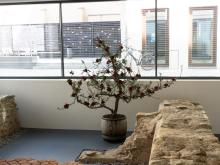
Excavation of the Dominican monastery in the Schlossplatz campus upgraded
The Renate and Prof. Dr.-Ing. Georg Unland Foundation made a donation to the university to enhance the excavations of the Dominican monastery of St Pauli (mid 13th century to 1537). The donor couple planted a rose bush in a large French wine barrel, which is now on public display in the lecture theatre building on Schlossplatz.
"In the Middle Ages, rose bushes were often planted in the cloisters of monasteries. The rose has various symbolic religious meanings. For example, it also symbolises the suffering and death of Jesus. A crown of thorns was placed on his head as he suffered," says founder Prof Georg Unland.
The large plant has been standing in the Schlossplatz quarter of the TU Bergakademie Freiberg since the beginning of April and is also clearly visible from the outside. Jens Then, Chancellor of the university, who accepted the donation in April, commented: "Many people interested in history regularly visit the excavations in the university's rooms. The rosebush as a piece of living nature now further enhances the excavations and points to the site's prehistory as a monastery. We are delighted with the donation from the Renate and Prof. Dr.-Ing. Georg Unland Foundation and will look after the rose bush carefully so that it remains at this historic site for a long time to come."
Im Februar 2024 hatten Altrektor Prof. Georg Unland und seine Ehefrau Renate Unland eine neue Stiftung an der TU Bergakademie Freiberg gegründet und der terra mineralia rund 200 neue Minerale übergeben. Die Spende für die Ausgrabungsstätte in der Freiberger Prüferstraße ist nun die bisher zweite Schenkung.
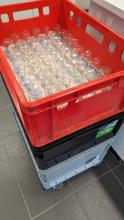
Donation to Freiberg secondary schools: New life for one thousand test tubes
On 11 April, the Institute of Analytical Chemistry at TU Bergakademie Freiberg handed over around 1,000 test tubes, Erlenmeyer flasks and other glassware to the three Freiberg secondary schools Gottfried Pabst von Ohain, Clemens Winkler and Clara Zetkin so that as many pupils as possible can carry out their own experiments in chemistry lessons.
During the current move from the existing chemistry building, the glassware was sorted out by the institutes, as it could no longer be used in the new laboratories in the Clemens Winkler building. "The schools were very interested in the offer and can now enable pupils to participate more in chemistry lessons," says Anne Fischer, technical employee at the Institute of Analytical Chemistry, who initiated the donation.
Erasmus project "Eco-Mining and Innovative Natural Resource Management" makes progress
Together with eight universities from six countries, the Erasmus project EMINReM is modernising study programmes for Master's degrees in the raw materials sector. Following the launch in May 2023, the project partners held a workshop at TUBAF from 25 to 28 March. The meeting aimed to transfer good practice on teaching content and forms on the topic of "Eco Mining" from the European Union partners to the 7 partner universities in Ukraine, Kazakhstan and Uzbekistan. Specifically, the Master's degree programmes "SINReM" and "Sustainable Mining and Remediation Management" were presented. In addition to content-related aspects of environmental, health and safety at work, issues relating to online programmes and quality assurance were of particular interest. The workshop included a tour of laboratories, the digital teaching environment at the Institute of Mining and semi-industrial and industrial test facilities. One focus was on forms of learning such as "problem-based learning" with the aim of encouraging students' creativity and independence.
Project Background
The project is funded as part of the European Union's Erasmus+ Key Action 2 programme. The universities in Freiberg, Jaen (Spain), Kütahya (Turkey) as well as in Zhytomyr, Dnipro and Donetsk (Ukraine), in Almaty and Karaganda (Kazakhstan) and in Tashkent and Navoi (Uzbekistan) are involved. "TU Bergakademie Freiberg has already enjoyed close cooperation with its partners in Ukraine, Kazakhstan and Uzbekistan for many years," emphasised Rector Klaus-Dieter Barbknecht when welcoming the guests, adding that "the international perspective of Freiberg University is expanding with the partners from Spain and Turkey".
TU Bergakademie Freiberg offers unique courses and international degree programmes that disseminate this knowledge worldwide. Students from over 40 countries are currently gaining insights into this scientific field in the Master's degree programmes "Sustainable Mining and Remediation Management" and "Groundwater Management". "The experience gained in teaching content and methods for the responsible extraction and processing of raw materials is now also being exchanged and further developed with the partners in EMinReM," says project manager Carsten Drebenstedt, explaining the University of Freiberg's involvement.
Honorary professorship of Satbayav University for Prof Carsten Drebenstedt
During a conference at the State Technical Research University in Almaty, Kazakhstan, TUBAF Professor Carsten Drebenstedt was appointed honorary professor of Satbayav University. The laudatory speech was given by Rector Professor Meiram Begentayev (in the picture on the left). The Freiberg researcher was honoured in recognition of his many years of continuous collaboration in research and teaching and for his commitment to effective international cooperation. For example, TUBAF and Satbayev University are currently working together on the Erasmus project EMINReM to modernise degree courses in the field of raw materials.

TUBAF becomes a centre for digital teaching and media services
As a member of the Arbeitsgemeinschaft der Medieneinrichtungen an Hochschulen e.V. (AMH), TU Freiberg hosted this year's Spring Conference 2024. 43 members of the universities came to Freiberg or took part virtually under the banner of digitalisation and the use of artificial intelligence. Together, they took stock of new technologies for digital and hybrid teaching. In workshops, the participants discussed new challenges for teachers, learners and staff at media institutions. The trend of development is continuing inexorably towards hybrid teaching programmes - whether you like it or not. Students cannot be forced to be present in the lecture theatre. The life models and realities of students and their demands have become too diverse for this, as summarised in the "World Café" during presentations from the partner universities.
The newly elected AMH Association Chairman Knut Zeigermann also spoke out clearly in favour of the use of AI (artificial intelligence) in the creation of digital teaching content. However, according to Zeigermann, this is by no means a substitute for basic knowledge and an existing infrastructure. Routine tasks will certainly be increasingly taken over by AI in the future. However, AI systems would also need specialised personnel for installation, maintenance and operation. Even the use of a digital set-up with several microphones, a mixing console, webcams and the participation of external speakers in remote conferences often causes anxiety among teaching staff. For Knut Zeigermann, it is therefore clear that AI will by no means replace employees in the field of media services at universities or reduce demand, but that areas of responsibility may shift. The guests were delighted with their stay in Freiberg and were able to take away many impressions and ideas from the guided tours of the new lecture theatre buildings at TUBAF, workshops and presentations at this year's AMH Spring Conference.
10 years of the scholarship programme with Mozambique - a success story that continues
For around ten years, scholarship holders from Mozambique have been coming to TUBAF on a regular basis. The successful programme is now being further developed: At the beginning of March, Susanne Gasda (International University Centre), Manuela Junghans (International University Centre) and Professor Dr Carsten Drebenstedt travelled to Maputo to renew the cooperation with the Ministry of Mineral Resources and Energy of Mozambique (MIREME). The partners signed an agreement that regulates the secondment of up to ten students per year to TUBAF. The students will initially be prepared for the one-year preparatory course to obtain a university entrance qualification and the language requirements. After successfully completing the preparatory course, the students begin their specialised studies at TUBAF. Five cohorts have already completed this preparation; eleven students have successfully completed their studies and are working at TUBAF as doctoral students, among other things, to gain further practical qualifications.
The Freiberg delegation also visited the University of Eduardo Mondlane in Maputo, with which a Memorandum of Understanding has been in place since 2017. In addition to meetings with the German Ambassador to Mozambique Ronald Münch and business representatives, the visit focused on the German-Mozambican Cultural Centre, where the young people are preparing for their move to Freiberg in terms of language skills. The aim of the collaboration is to ensure that the Mozambicans arrive in Freiberg as well prepared as possible.
"H2Giga" lead project: recycling raw materials from electrolysers
The "H2Giga" flagship project of the Federal Ministry of Education and Research (BMBF) aims to promote the series production of electrolysers for hydrogen production in order to support the goal of becoming climate-neutral by 2050, which is anchored in the European Green Deal. Electrolysers are devices that use electricity to split water into oxygen and hydrogen. The latter is the target product and a key building block for CO2 emission-free technologies. Around 10 million tonnes of green hydrogen are to be produced in Germany in stages by 2030, i.e. hydrogen that is generated using renewable energies in order to help reduce CO2 emissions.

12 research teams from the H2Giga project "ReNaRe: Recycling - sustainable use of resources" are addressing this issue and developing innovative recycling and utilisation concepts for so-called proton exchange membrane and high-temperature electrolysers. The aim is to recycle the valuable and critical raw materials used in the electrolyser, such as iridium, ruthenium, rare earths or platinum, on a technical scale in a resource-efficient and environmentally friendly manner and thus keep them in the cycle even after their initial technical use. The "ReNaRe" annual meeting 2024, which took place from 17 to 18 January 2024 with around 30 participants at TU Bergakademie Freiberg, not only provided an opportunity for personal exchange between the researchers, but also emphasised the crucial role of cooperation between the research teams.
Further information
Prof. Dr Urs Peuker, coordinator of the "ReNaRe" project at TU Bergakademie Freiberg, continues: "Our project aims to identify possible technical approaches and process routes and to develop initial quantitative results for these with regard to the effectiveness of mechanical, chemical and metallurgical recycling. The focus is on the conceptualisation of possible recycling approaches, which is always a combination of different technologies in different steps."
Review of a successful "ReNaRe" annual meeting 2024 in Freiberg
Project partners:
- DECHEMA Gesellschaft für Chemische Technik und Biotechnologie e. V.
- .V.
- Forschungszentrum Jülich GmbH
- Fraunhofer Institute for Manufacturing Engineering and Automation (IPA)
- Helmholtz Institute Freiberg for Resource Technology (HZDR-HIF)
- Heraeus Precious Metals GmbH & Co. KG
- Karlsruher Institute of Technology (KIT), wbk Institute for Production Technology
- Öko-Institut e.V., Institute for Applied Ecology
- RWTH Aachen University, Metallurgical Process Engineering and Metal Recycling (IME)
- TU Bergakademie Freiberg, Institute of Ceramics, Refractories and Composites
- TU Bergakademie Freiberg, Institute of Mechanical Process Engineering and Mineral Processing (coordination)
- TU Munich, Straubing Campus for Biotechnology and Sustainability

The diversity of materials - MINT-EC camp "Future Materials" in Freiberg
On 5 March, the four-day MINT-EC camp "Future Materials" starts at the Technische Universität Bergakademie Freiberg. For four days, 20 pupils from schools in the national excellence school network MINT-EC will work on the topic of materials from production to further processing and their use in modern technology.
The camp begins with an introductory lecture on the topic. The students then take part in a guided tour of terra mineralia, the mineral exhibition at Freudenstein Castle in Freiberg. Over the course of the camp, the participants work in groups on a project. A factory tour is also on the agenda. While one half visits BGH Edelstahl Freital, a company in the steel and mining industry, the other half explores the metal processing company Saxonia Galvanik. At the university, the young people will get to know students from the Racetec team and solve puzzles in the "Materials" escape room.
About MINT-EC - The national excellence school network
MINT-EC is the national excellence network of schools with upper secondary level and a distinctive profile in M mathematics, I computer science, N natural sciences and T technology (STEM). It was founded in 2000 by employers and works closely with their regional education initiatives. MINT-EC offers a wide range of events and support programmes for pupils as well as training and professional exchange for teachers and school administrators. The network, which currently has 341 certified schools, has been under the patronage of the Standing Conference of the Ministers of Education and Cultural Affairs of the Länder (KMK) since 2009. The main sponsors of MINT-EC are the employers' association Gesamtmetall as part of the think ING. initiative as well as the Siemens Stiftung and the Bavarian employers' associations bayme vbm and vbw.
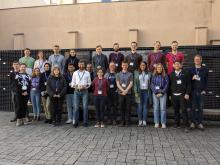
Workshop further develops software for geology and materials science
From 4 to 13 March, scientists from almost 20 countries will meet at a workshop at TU Bergakademie Freiberg to discuss current challenges in the modelling and characterisation of polycrystalline materials. The focal point of the workshop is the open source software MTEX, which has been developed by TUBAF mathematician Prof Dr Ralf Hielscher and an international team for more than 15 years. This software is used worldwide in industry and research to analyse electron microscopy images in materials science, geology and crystallography and exemplifies the interdisciplinary focus of mathematics at TU Freiberg.
- All information about the software
- More about the specialist area of Professor Ralf Hielscher

Workshop further develops software for geology and materials science
From 4 to 13 March, scientists from almost 20 countries will meet at a workshop at TU Bergakademie Freiberg to discuss current challenges in the modelling and characterisation of polycrystalline materials. The focal point of the workshop is the open source software MTEX, which has been developed by TUBAF mathematician Prof Dr Ralf Hielscher and an international team for more than 15 years. This software is used worldwide in industry and research to analyse electron microscopy images in materials science, geology and crystallography and exemplifies the interdisciplinary focus of mathematics at TU Freiberg.
- All information about the software
- More about the specialist area of Professor Ralf Hielscher

Workshop further develops software for geology and materials science
From 4 to 13 March, scientists from almost 20 countries will meet at a workshop at TU Bergakademie Freiberg to discuss current challenges in the modelling and characterisation of polycrystalline materials. The focal point of the workshop is the open source software MTEX, which has been developed by TUBAF mathematician Prof Dr Ralf Hielscher and an international team for more than 15 years. This software is used worldwide in industry and research to analyse electron microscopy images in materials science, geology and crystallography and exemplifies the interdisciplinary focus of mathematics at TU Freiberg.
- All information about the software
- More about the specialist area of Professor Ralf Hielscher
Merits for cooperation with the University of Zhytomir: honorary doctorate for Carsten Drebenstedt
Professor Carsten Drebenstedt received an honorary doctorate from Zhytomir University of Technology on 15 February 2024 for his services to cooperation between the Ukrainian university and TU Bergakademie Freiberg and for the development of TU Zhytomir. The rector of the university, Vіktor Valeryovich Ewdokimov, thanked TU Bergakademie Freiberg for promoting cooperation, especially in the current difficult times. In his response, Professor Drebenstedt emphasised that investment in education and research is particularly important in times of crisis. He accepted the award on behalf of all those involved in the university cooperation.
About the university co-operation
Freiberg and Zhytomir have been linked by a relatively new university cooperation programme since 2008. This was followed in 2009 by study trips and conference participation at TU Bergakademie Freiberg, some of which lasted several months and were financially supported by the German Academic Exchange Service (DAAD), as well as the first joint programme in the European Union's ERASMUS programme. TUBAF and the Technical University of Zhytomir have been working together on three projects since 2020.
The TU Zhytomir currently educates 9,000 students in 6 faculties: Business and Services; Mining, Environmental Management and Civil Engineering; Information and Computer Technologies; Computer Integrated Technologies, Mechatronics and Robotics; National Security, Law and International Relations; and Education and Lifelong Learning. For TU Bergakademie Freiberg, there are numerous points of contact in teaching and research.
Network of Jewish university lecturers in Germany, Austria and Switzerland founded
Press release from the Network of Jewish University Teachers:
In Germany, Austria and Switzerland, anti-Semitism at universities has increased dramatically since 7 October. Many Jewish students, lecturers and other university staff no longer feel safe at their universities. Some stay away from the campus out of fear or for security reasons, some can only work there with personal protection. Many hide their Jewish identity and no longer dare to express their opinions freely in the face of massive anti-Israeli protests. In order to counter this increasing anti-Semitism and to give Jewish university lecturers a forum, a voice and the opportunity to speak out together, professors and lecturers from all disciplines at universities and colleges in Germany, Austria and Switzerland came together at the end of 2023. The network currently comprises more than 70 university lecturers. It has set itself the goal of:
- raising awareness of rampant anti-Semitism in all its forms, especially Israel-related anti-Semitism, at universities.
- To work with university management and other status groups to develop effective concepts for combating anti-Semitism and for Jewish life at universities and in research and to implement targeted measures in line with the German government's National Strategy against Anti-Semitism and for Jewish Life.
- To provide an exchange platform for Jewish university lecturers and to network them with other national and international groups.
- To seek cooperation with Jewish students and Jewish members of other status groups at universities and to support them through contact points and
mentoring. - To promote and organise cross-university events and studies on topics relating to Jewish life, Jewish identities and the analysis and combating of anti-Semitism.
We would like to work together with the German Rectors' Conference (HRK) to find effective ways to implement the goals of the HRK's press release on combating anti-Semitism from 15 November 2023. Jewish perspectives on anti-Semitism on campus must be given special consideration. All Jewish university lecturers at universities in Germany, Austria and Switzerland who would like to join and support the network, as well as guests who feel particularly closely connected to the cause, are invited to send an email to Juedische [dot] Hochschullehrende [at] gmail [dot] com (Juedische[dot]Hochschullehrende[at]gmail[dot]com).
Contact person at the TU Bergakademie Freiberg is Dr Ilja Kogan, honorary lecturer for vertebrate palaeontology.
Tel: 0371 488-4559
Mobile: 0162 1562033
kogan [at] naturkunde-chemnitz [dot] de (kogan[at]naturkunde-chemnitz[dot]de)
Further contacts: Deidre Berger, Julia Bernstein, Roglit Ishay, Haya Schulmann, Michael Waidner
Email: Juedische [dot] Hochschullehrende [at] gmail [dot] com (Juedische[dot]Hochschullehrende[at]gmail[dot]com)

First successful appointment from tenure-track programme
Following a positive evaluation, Prof. Dr Björn Sprungk was appointed to the Professorship of Applied Mathematics at TU Bergakademie Freiberg on 31 January 2024. This makes the Freiberg University alumnus, who has been researching and teaching as a junior professor at TU Bergakademie Freiberg since February 2020, the first permanent professor that TU Bergakademie Freiberg has been able to recruit from the tenure track programme. The mathematician works on methods for quantifying uncertainties in simulations and forecasts and teaches students in probability theory and data science.
More about Björn Sprungk (internal area)
By participating in the tenure-track programme to promote young academics, the university is following the recommendation of the German Council of Science and Humanities for a cultural change in line with the Anglo-American tradition. The aim is to give young academics the opportunity to embark on a predictable academic career at an early stage. The federal and state governments are currently funding seven tenure-track professorships at TU Bergakademie Freiberg. A total funding volume of up to one billion euros is available for the junior researcher programme, which runs until 2032.
More about the tenure-track professorships (internal area)
